
The Raging 2020s: Companies, Countries, People - and the Fight for Our Future
by
Alec Ross
Published 13 Sep 2021
Between 2004 and 2019, Google used: Edward Helmore, “Google Says It Will No Longer Use ‘Double Irish, Dutch Sandwich’ Tax Loophole,” Guardian, January 1, 2020, https://www.theguardian.com/technology/2020/jan/01/google-says-it-will-no-longer-use-double-irish-dutch-sandwich-tax-loophole. Google was forced to abandon: Toby Sterling, “Google to End ‘Double Irish, Dutch Sandwich’ Tax Scheme,” Reuters, December 31, 2019, https://www.reuters.com/article/us-google-taxes-netherlands-idUSKBN1YZ10Z; Jeremy Kahn, “Google’s ‘Dutch Sandwich’ Shielded 16 Billion Euros from Tax,” Bloomberg, January 2, 2018, https://www.bloomberg.com/news/articles/2018-01-02/google-s-dutch-sandwich-shielded-16-billion-euros-from-tax.
…
The difference is that multinationals have the accountants, lawyers, and international footprints to build paper trails that span oceans, and you can only draft invoices across town. If you are a pizza delivery driver, the offshore world is out of your reach. With that in mind, we will go back to Google. THE DOUBLE IRISH WITH A DUTCH SANDWICH Between 2004 and 2019, Google used a pair of profit-shifting maneuvers—the “Double Irish” and “Dutch Sandwich”—to move the vast majority of its global earnings into Bermuda. Different versions of the Double Irish were also used by Facebook, Pfizer, Coca-Cola, Cisco, and other American multinationals. The maneuver follows the same basic logic as your pizza delivery scheme: raise costs in high-tax jurisdictions and move profits to low-tax jurisdictions.
…
The Netherlands also introduced a 21.7 percent tax on royalties and other payments that flow to low-tax jurisdictions like Bermuda, effectively taking the Dutch Sandwich off the menu. These measures addressed the specific techniques used for a particular type of tax avoidance but did not solve the underlying problem. For every Double Irish with a Dutch Sandwich, there are dozens of equally tricky maneuvers that are known only to the lawyers and accountants who dream them up, as well as the companies that put them to use. The offshore world is like an iceberg, with the vast majority out of sight. Even right in Ireland, just as the Double Irish was phasing out, a replacement quietly entered stage left.
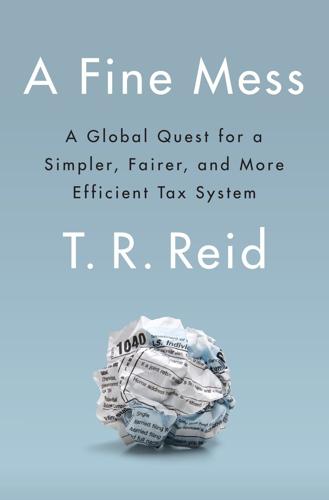
A Fine Mess
by
T. R. Reid
Published 13 Mar 2017
Corporations Pay 35%,” Wall Street Journal, Oct. 27, 2013, www.wsj.com/articles/SB10001424052702303902404579152271744452490. 6. Offshore Profit Shifting and the U.S. Tax Code—Part 2 (Apple Inc.), U.S. Senate Permanent Subcommittee on Investigations, May 21, 2013, 152–91. 7. Jesse Drucker, “‘Dutch Sandwich’ Saves Google Billions in Taxes,” Bloomberg Businessweek, Oct. 22, 2010. Another excellent explanation of Google’s “Double Irish” system can be found in Cyrus Farivar, “Silicon Valley Fights to Keep Its Dutch Sandwich and Double Irish Loopholes,” Ars Technica, Jan. 20, 2014. 8. Offshore Profit Shifting and the U.S. Tax Code—Part 1 (Microsoft and Hewlett-Packard), U.S. Senate Permanent Subcommittee on Investigations, Sept. 20, 2012, 180–81. 9.
…
For all Senator McCain’s ire, Apple’s subsidiary-of-a-subsidiary-of-a-subsidiary structure—the scheme that placed $74 billion beyond the reach of the tax authorities—was actually not as convoluted as another tax-dodging contraption, the intricate mechanism known as a “Double Irish with a Dutch Sandwich.” This one works nicely to shield profits from the tax man for companies that have a good deal of intellectual property, like search engines, software, cancer drugs, or computer operating systems. The “Double Irish” has been used by the likes of Apple and Microsoft, but it’s generally agreed, among aficionados of tax avoidance, that the paradigm case of this particular apparatus is Google’s international tax shifting, which is complicated to the point of being difficult to pin down precisely
…
Congress, 5, 10 See also charitable contributions; mortgage interest deductions; tax breaks Delaware, 19, 160, 204 Democrats, 43, 60, 64–68, 117, 132, 148, 162, 188, 190, 245 Denmark, 38, 102, 105, 120 government spending in, 23, 126 high tax rates of, 17, 19 property taxes in, 175 simple tax returns of, 221 tax revenues of, 14, 16, 79, 126 VAT rates of, 239 Depardieu, Gérard, 133–34, 139, 151 depletion/depreciation allowances, 64–66, 69–70 derivatives, 181, 184 dividends, 6, 9, 23, 36, 55, 70, 111, 147, 168, 170, 173, 193, 233, 241, 254, 256 “Double Irish with a Dutch Sandwich,” 151–53, 161, 164 Douglas, Roger, 60–61 dynamic scoring theory, 101 earned income tax credit (EITC), 210, 217–18, 238, 250 East Asia, 21, 23, 228 eastern Europe, 93–95, 101–14 economic growth, 16, 36, 41–43, 50, 52, 55, 91, 101, 104–8, 114, 120, 124, 136, 238 economic impact of taxes, 16, 95, 100–101 Economic Recovery Tax Act of 1981 (ERTA), 64 Economist magazine, 58, 104, 126 education, 36, 44, 53, 63, 70, 79, 84, 105, 117–18, 123, 126–27, 168, 175, 180, 221 Egypt, 200, 239 Eisenhower, Dwight, 2 electronic trading, 181–84 emissions.
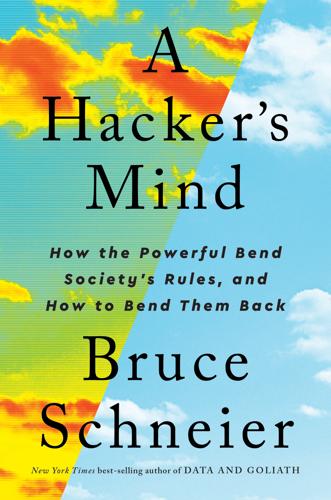
A Hacker's Mind: How the Powerful Bend Society's Rules, and How to Bend Them Back
by
Bruce Schneier
Published 7 Feb 2023
HACKING SYSTEMS 13The tax laws themselves: Dylan Matthews (29 Mar 2017), “The myth of the 70,000-page federal tax code,” Vox, https://www.vox.com/policy-and-politics/2017/3/29/15109214/tax-code-page-count-complexity-simplification-reform-ways-means. 13Microsoft Windows 10: Microsoft (12 Jan 2020), “Windows 10 lines of code,” https://answers.microsoft.com/en-us/windows/forum/all/windows-10-lines-of-code/a8f77f5c-0661-4895-9c77-2efd42429409. 14surprise tax bills: Naomi Jagoda (14 Nov 2019), “Lawmakers under pressure to pass benefits fix for military families,” The Hill, https://thehill.com/policy/national-security/470393-lawmakers-under-pressure-to-pass-benefits-fix-for-military-families. 15Here’s how it worked: New York Times (28 Apr 2012), “Double Irish with a Dutch Sandwich” (infographic), https://archive.nytimes.com/www.nytimes.com/interactive/2012/04/28/business/Double-Irish-With-A-Dutch-Sandwich.html. 15US companies avoided paying: Niall McCarthy (23 Mar 2017), “Tax avoidance costs the U.S. nearly $200 billion every year” (infographic), Forbes, https://www.forbes.com/sites/niallmccarthy/2017/03/23/tax-avoidance-coststhe-u-s-nearly-200-billion-every-year-infographic. 15income tax deductions for property taxes: US Internal Revenue Services (27 Dec 2017), “IRS Advisory: Prepaid real property taxes may be deductible in 2017 if assessed and paid in 2017,” https://www.irs.gov/newsroom/irs-advisory-prepaid-real-property-taxes-may-be-deductible-in-2017-if-assessed-and-paid-in-2017. 16its fix won’t be complete: Jim Absher (29 Jan 2021), “After years of fighting, the military has started phasing out ‘Widow’s Tax,’ ” Military.com, https://www.military.com/daily-news/2021/01/19/after-years-of-fighting-military-has-started-phasing-out-widows-tax.html. 4.
…
The practical effect of that mistake was that surviving family members were hit with surprise tax bills of $10,000 or more. That’s a bug. It’s not a vulnerability, though, because no one can take advantage of it to reduce their tax bill. But some bugs in the tax code are also vulnerabilities. For example, there was a corporate tax trick called the “Double Irish with a Dutch Sandwich.” It’s a vulnerability that arose from the interactions of tax laws in multiple countries, finally patched by the Irish. Here’s how it worked: The US company transfers assets to an Irish subsidiary. That subsidiary charges the US company huge royalties from sales to US customers. This dramatically lowers the company’s US taxes, and Irish taxes on royalties are designed to be low.
…
To combat this, they need to monitor regulated parties and be ready to act quickly to police new products that emerge post-regulation, knowing that they won’t necessarily get it right the first time around—and patch all vulnerabilities as soon as they emerge. 31 Jurisdictional Interactions The Double Irish with a Dutch Sandwich tax loophole that companies like Cisco, Pfizer, Merck, Coca-Cola, and Facebook used to avoid paying US taxes stemmed from the limitation of laws by national borders. By making clever use of foreign subsidiary companies and transferring both rights and incomes between them, large US corporations are able to avoid paying taxes on much of their global income.
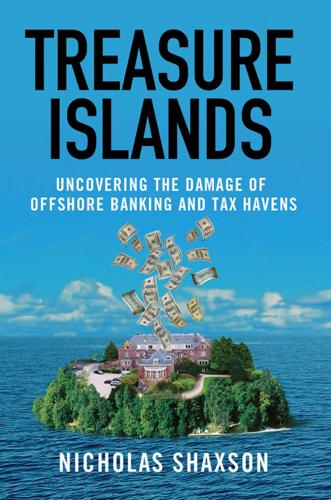
Treasure Islands: Uncovering the Damage of Offshore Banking and Tax Havens
by
Nicholas Shaxson
Published 11 Apr 2011
In the banana example, tax revenue has been drained out of a poor country and into a tax haven and funneled through to the wealthy owners of a multinational corporation. In October 2010 a Bloomberg reporter explained how Google Inc. cut its taxes by $3.1 billion in the previous three years through transfer pricing games known by names such as the “Double Irish” and “Dutch Sandwich,” ending up with an overseas tax rate of 2.4 percent.7 The problem is getting worse. Microsoft’s tax bill has been falling sharply, for similar reasons. Cisco is at it.8 They are all at it. Transfer pricing alone cost the United States an estimated $60 billion a year9—and that is just one form of the offshore tax game.
…
J., 66 capital controls, 56–61, 63, 82, 84, 240n16,17, 246n11 “capital flight,” 20, 30, 53–4, 57–8, 93, 97, 110, 139–43, 160, 183, 250n26 European flight capital (1930s), 58 capital flows, 9, 18, 20–1, 28–30, 32, 50–61, 63, 75, 78, 80, 82, 84–5, 92–3, 108–9, 112, 127, 130–1, 138–40, 144, 164–5, 183, 217, 219, 221–2, 237n44, 240n16,17, 241n9, 246n4,11, 257n50 controls on: See capital controls and corporations, 29 free, 55–7, 219 inflows, 21, 30, 58–60, 109, 165, 237n44, 241n9 and Keynes, 50–61 and language, 30 outflows, 30, 75, 92, 112, 138–9, 183, 217, 237n44, 241n9 and social capital, 164–5 See capital controls capital gains tax, 155, 162–3 Capone, Al, 88 Carlisle, Rodney, 23 Carter, Jimmy, 114, 117, 200 Carteret, George, 106 Carville, James, 52 Cary, William, 124 “casino banking,” 67 Castle Bank and Trust (Cayman) Ltd., 100–1 Castro, Fidel, 88–9, 93, 99 Cato Institute, 150, 155, 163 Cayman Islands (British overseas territory), 6, 10, 12–13, 18–19, 23–4, 26–7, 44, 46, 74, 79, 82, 87, 90–6, 99–103, 106, 125–6, 128, 132–5, 161, 163, 165–7, 171–92, 211–12, 214–15, 223, 234n12, 235n22, 236n31, 243n59, 248n39, 256n40 British power structure within, 18, 94 and Confidential Relationships (Preservation) Law, 101–2 and denial of tax haven status, 12–13 and drug money, 101–2 employment in, 171–92 and Enron, 23 and hedge funds, 26 history of as tax haven, 90–6 “Star Trust,” 46 statistics on, 18 Cayman Islands Monetary Authority (CIMA), 214–15 Center for Freedom and Prosperity (CF&P), 150, 160 Center for International Policy (Washington, D.C.), 29 Central Bank of Philippines, 141 Chait, Jonathan, 170 Chang, Ha-Joon, 59 Charles II of England, 72–3, 104 Chase Manhattan, 107–8, 112, 114, 172, 197 Chase National Bank, 194–7, 200–1 chasse gardée, 3 Chenoweth, Neil, 7 Chicago, 36, 40–1, 61, 125 meatpackers, 36, 40–1 China, 1, 12, 14, 16, 27, 36–7, 60, 71, 81, 85, 88, 105–6, 121, 147–8, 164, 169, 217 and Britain, 105–6 statistics on oil, 1 Chirac, Jacques, 4 Christensen, John, 19, 103–4, 115–16, 146, 150, 170, 182–91, 207, 233n1 Churchill, Winston, 49 CIMA: See Cayman Islands Monetary Authority Cisco, 14 Citicorp (Citibank), 8, 80–1, 141–2, 152, 194–6, 201 Citigroup, 20, 68, 103 Citizens for Tax Justice, 112, 159, 170 City of London (England, U.K.), 17–19, 24, 26, 54–5, 61, 63–86, 87–8, 98, 103, 105–6, 109, 115, 129–30, 134, 136, 147–8, 182, 212, 222, 224, 235n18, 236n23,25,28, 239n13, 242n27,32,34, 243n36,37,42, 244n72 and Britain’s offshore spiderweb, 68–9 and the Caribbean, 87–106 central organization of, 70–4 See City of London Corporation and City Cash, 74 controlling role of, 45–6, 96–6 and “domicile” rule, 69 global reach of, 18 history of, 63–86, 87 See “Big Bang”; Euromarkets and international financial deregulation, 85–6 and lending, 76–8 and “London-grad,” 69 and loopholes, 67–8 as old boys network, 64–5 and “rehypothecation,” 68 and secrecy, 69 and Special Purpose Vehicles (SPVs), 26 tentacles of: See British Crown Dependencies; British overseas territories; British zones of influence and the U.S., 67–8, 78–84 City of London Corporation (Corporation of London), 70–4, 76, 85–6, 224, 242n25, 243n36–37, 244n72 head of: See Lord Mayor of London history of, 71–2 and voting rights, 71 civil society, 170 Clinton, Bill, 52, 119–20, 150, 160 Clinton, Hillary, 30, 58 Coalition for Tax Competition, 150 Cold War, 75, 109, 138 Coleman, Norm, 121 Colombia, 26, 101, 111, 133, 136 Medellin drug cartel, 101, 133 colonialism, 2–8, 20, 23, 65, 88–9, 93–5, 104–5, 117, 138, 147, 161, 184 Commodity Futures Trading Committee (CFTC), 68 Compact of Free Association, 22 comparative advantage theory, 16 competition, tax, 149–56 Confidential Relationships (Preservation) Law, 101–2 Congdon, Tim, 66 ConocoPhilips, 22 Cook, Geoff, 168 Cornfeld, Bernie, 97–8 corporate governance, 39, 85, 122–5, 201–2 corporate responsibility, 228–9 The Corporation (Bakan), 158 Corporation Trust (Delaware), 125–6 corruption, 126–8, 229 Corruption Perceptions Index (CPI), 126 country-by-country reporting, 222 Cowperthwaite, Sir John, 105 Craven, John, 81 credit cards, 193–201 criminal money See arms trafficking; bribes; drug money; mob/mafia; terrorist financing Crocodile Dundee, 33 Crook, Kenneth, 93–5 Cuba, 88–9, 93 currency trading, 63–4, 70 Cyprus, 10, 27, 33, 138, 238n52 Dai Xianglong, 86 Davison, Daniel, 81 Deepwater Horizon, 22 de la Torre, Lisandro, 36, 38, 46–7 de Rugy, Veronique, 150 deferrals, tax, 112–13 Delaware, 22, 26, 39–40, 120–1, 123–6, 150, 166, 193–201, 204, 207–12, 214, 222, 228, 247n31, 248n34,39,42, 254n3,4, 255n18, 256n40 Chancery Court, 124–5, 248n34 Corporation Trust office, 125–6 history of offshoring, 39–40, 123–6 and jurisdictions, 193–201, 204, 207–12, 214 and securitization/bundling, 26, 125 and usury, 193–5, 200, 204 Delaware Statutory Trust Act (1988), 201 DeLay, Tom, 160–1 Deloitte & Touche, 25, 202, 209 DeLong, Bradford, 49, 55, 158–9 democracy, 7–8, 13, 31, 33, 42, 56, 71, 82, 102, 113, 123, 129, 131, 144–8, 162, 164, 170, 182, 185, 189, 192, 195–6, 198, 206, 210, 212, 219, 222, 224 and taxation, 144–8 Democratic party, 31, 82, 123, 185, 195, 198, 254n4 Democratic Republic of Congo, 131 deregulation, 32, 52, 66, 74–6, 85, 87, 115, 129–30, 132, 155, 159, 182, 193, 200, 209–10, 212, 217 developing countries, 8, 28–30, 57–60, 91, 93, 97, 100, 108, 126, 129–48, 155–6, 164, 169, 183, 217, 222–5, 227, 229, 236n29, 237n44, 240n22, 246n13, 250n26 and blame-the-victim, 8, 29, 140–4 and capital, 57–60 and capital flight, 139–43 and mobile phone charges, 148 and the offshore system, 129–48 and reform, 223–4 and sovereign debt funds, 143–4 and tax, 144–8 and tax treaties, 147–8 See Bank of Credit and Commerce International Deviers-Joncour, Christine, 5 Dill, James B., 39 Disney, 7, 88 Double, Paul, 73 double taxation, 26, 41–2, 130, 146 defined, 26 “Double Irish,” 14 drug money, 6, 9, 18, 20, 22, 26–7, 29, 88, 101–2, 111, 120, 131–3, 136 du Pont, Pierre S. (“Pete”), 194–9 Dubai, 19 Duggan, Nick, 165–6 “Dutch Sandwich,” 14, 117 Dutch Special Financial Institutions, 27 Dumas, Roland, 5 The Economic Consequences of the Peace (Keynes), 50 Ernst & Young, 25, 202, 205, 209, 249n5 The Economist, 7, 22, 24, 237n36 “efficiency,” 16, 41, 53, 130, 153–4, 158–66, 214, 219, 229–30 Egypt, 65–6, 86 Elf Aquitaine (France), 2–8, 20, 28, 70, 131, 136 elites/the rich, 2–4, 6–10, 11, 16–17, 20–3, 26, 30–2, 35, 59, 90–1, 100, 106, 126, 131, 140–5, 148, 157–8, 185, 187, 192, 195, 210, 224 Elmer, Rudolf, 147–8, 192, 214–15 Engels, Friedrich, 104 Enron, 23, 68, 132, 166, 202, 204, 218 Eurobonds, 75–6 Eurodad, 30 Eurodollar market: See Euromarket Euromarkets, 11, 66–7, 75, 77–83, 112, 114, 129–30, 241n11, 243n59 reserve requirements, 76–8 Euromoney, 80 European tax havens, 16–17, 21, 23 See Austria; Belgium; Euromarkets; Luxembourg; Netherlands; Switzerland ExxonMobil, 108 Fairchild Corp.
…
American corporations could cook up a version of what was known as a “Dutch Sandwich”—set up an offshore finance subsidiary in the Netherlands Antilles, then use it to issue tax-free Eurobonds and send the proceeds up to the American parent. The United States could argue that it did not have to tax this income from the Antilles, under the rules of its tax treaty with this former Dutch colony via its postcolonial relationship with the Netherlands. The U.S. Internal Revenue Service could easily have decided that the Dutch Sandwich was a sham and taxed the income. But it looked the other way. “These were Eurobonds, bearer bonds, which were virtually impossible to tax,” explained Michael J.
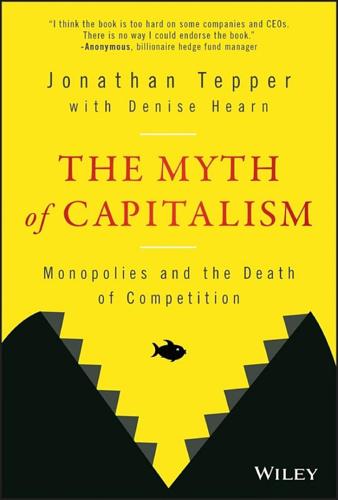
The Myth of Capitalism: Monopolies and the Death of Competition
by
Jonathan Tepper
Published 20 Nov 2018
“There is government,” he wrote, “whenever one person or group can tell others what they must do and when those others have to obey or suffer a penalty.”18 Under Hale's definition, the tech giants are effectively governments unto themselves. In tax matters, the companies stand effectively beyond the laws of national governments, playing one country against another in a race to the bottom. Their arrangements mock national governments. Facebook, Google, and other tech companies have used arrangements known as a “Double Irish” and a “Dutch Sandwich,” to shield the majority of their international profits from the taxman. They shift revenue from one Irish subsidiary to a Dutch company with no employees, and then on to a Bermuda mailbox owned by another Ireland-registered company.19 It is a farce, and it is all perfectly legal. The ultimate loss from unpaid taxes is an estimated 60 billion euros a year for the weakest members of the European Union.20 While individuals and small businesses pay high levels of taxes, the share of corporate profits that multinationals have reported in tax havens has increased tenfold since the 1980s; much of this is coming from the large tech companies.21 The tech giants increase income inequality, because the losers are the people and small businesses who do pay taxes and the winners are the shareholders of the companies that use them to dodge taxes.22 The tech giants preach social solidarity and not being evil (Google recently decided to drop their motto “Don't be evil,” as it seemed out of fashion), while they funnel billions into offshore havens and channel their European operations through tax-friendly Ireland.
…
(Supreme Court merger prohibition), 154 Brown Shoe case, 153–154 Buffalo Courier-Express (business loss), 2 Buffalo Evening News (Buffett purchase), 2 Buffett, Warren, 196 billionaires, agreement, 1 investor waste, 201–202 Morgan, comparison, 198 Bunge, market dominance, 133 Burke, Edmund, 239 Burns, Arthur Robert, 145 Busch III, August, 29 Bush, George W., 161 reverse revolvers, 191–192 Businesses dynamism, decline, 46 investment level, reduction, 205 Buyback corporation, 208 Buybacks impact, 206 increase, 207f share buybacks, limitation, 247 C Cable mergers, impact, 43 monopolies/local monopolies, 116–117 Capital access, 66 ownership, worker shares, 246 perspective (Marx), 9 Capital in the Twenty-First Century (Piketty), 213–214 Capitalism problem, US/UK perception, 213 reforming, 239 Capital Returns (Marathon Asset Management), 8 Capone, Al, 22 Captured Economy, The, (Lindsey/Teles), 188 Cardinal Health, price-fixing allegations, 131 Cargill, market dominance, 133 Carlton, Dennis, 163 Carnegie, Andrew, 139, 143 Carpenter II, Dick M., 83 Cartels Chicago School perspective, 23 promotion, central bank rates (impact), 26f study, 25 Cartels: A Challenge to a Free World (Berge), 150 Castellammarese War, 21 CBS Corporation, market dominance, 133 CelebrityNetWorth, Google data theft, 89–90 Central Selling Organization, 24 CEO-to-worker compensation ratio, increase, 221f Chamberlin, Edward, 7 Chambers, Dustin, 179 Chemotherapy regulation, 167 usage, 178 Chicago School, 155–156 China, Big Data/Big Brother (relationship), 112 Chipotle, McDonald's release, 56 Christensen, Clayton, 55 Citigroup, market dominance, 127 Civil government, instituting, 191 Clayton Act of 1914, 7 Clayton Antitrust Act (1914), 144, 160, 209 Clemenceau, George, 233 Clifton, Daniel, 187 Clinton, Bill (reverse revolvers), 191 Clinton, Hillary, 189, 212 Coal Question, The, ( Jevons), 18 Cohn, Gary, 189 Collusion, impact, 32 Community Standards (Facebook), 92 Commuting zones, labor concentration (increase), 73f Companies growth phases, 52f lobbying, returns (comparison), 187f long-term returns, 204 platform companies, 97–98 self-disruption, failure, 55 synergies, 41 technology purchases, 106 Competition absence, 241 encouragement, patents (expiration), 246 Google, impact, 95 patents, impact, 175 promotion, patents/copyrights (impact), 246 reduction, mergers and acquisitions (impact), 12 restoration, Representative/Senator encouragement, 248 Competitors conflict, 31 reduction, mergers (prevention), 242 Composition, fallacy, 18 Computer operating systems, monopolies/local monopolies, 117 Concentrated industries, ranking, 33t Concrete, mergers (impact), 43 Confessions of the Pricing Man (Simon), 29 Conglomerates, purchase, 154 Connor, John, 23 Conrad, Jeremy, 54 Consumers, desires, 115 Consumer welfare, 158–159 Contract workers, hiring (fervor), 75–76 Copyrights, 246 Copyright Term Extension Act, 174 Corbyn, Jeremy (selection), 212 Corporate profits employee compensation, contrast, 223f increase, 65 Corporate trusts, control, 234 Costco workers, needs (understanding), 77 Counterfeits, impact, 102–103 Cox, Archibald, 157 CR4, 33 Creating and Restoring Equal Access to Equivalent Samples Act (CREATES), 176 Creative destruction, process, 45 Credit reporting bureaus, oligopolies, 125 Credit Suisse, Global Wealth Report issuance, 218 study, 10 Crisis of Capitalism, A, (Posner), 156 Curry, Steph, 3 Curse of Bigness, The, (Brandeis), 237 Customer lock-in (reduction), rules (creation), 246 CVS Caremark, market dominance, 130 D Dairy Farmers of America, price fixing, 119 Dalio, Ray, 229 David, Larry, 89 DaVita, Fresenius (merger), 124 Dayen, David, 96 Dean Foods, price fixing, 118–119 De Beers Consolidated Mines (cartel), 24 Decartelization Branch, 151–152 Decartelization/deconcentration policy, 150–151 Decker, Ryan, 47 Decline of Competition, The, (Burns), 145 de Loecker, Jan, 41, 226 Dent, Robert, 52 Diapers.com, Amazon predation, 106 Dickens, Charles, 18 Digital Millennium Copyright Act, 103 Digital platforms, scale, 91 Dimon, Jamie, 182 Dirlam, Jeff, 167 Disraeli, Benjamin, 240 Diversity, impact, 58–61 DNA damage, 178 Dodd-Frank Act 2010 Full Employment Act for Lawyers, Accountants, and Consultants, 182 impact, 181 passage, 184 Döttling, Robin, 56 Doubleclick, Google acquisition, 91, 118 “Double Irish” arrangement, 92–93 Dow Chemicals, DuPont (merger), 121 Dreyfus, market dominance, 133 Drugs prices, high level, 174 reformulation, 175 wholesalers, oligopolies, 131–132 Duisberg, Carl, 146–147 Duke, James Buchanan, 142 Duke, Mike, 16 Dunbar's Number, creation, 51 Duopolies, 15, 115–116, 122–125 Durant, Will, 231 Düsseldorf Agreement, 148 “Dutch Sandwich” arrangement, 92–93 E Echo Show (Amazon), 107 Economic dynamism, reduction, 37 Economic freedom, 143–144, 233, 238–239 Economic inequality, increase, 227–228 Economic model, adjustment, 41–42 Economies of scale, increase, 51 Economy advanced economies, markups (increase), 228f firms, role (decrease), 48f problems, Trump perspective, 213 Edison, Thomas, 67, 195 Eeckhout, Jan, 41, 226 Eisenhower, Dwight, 146, 148, 151 Ellenberg, Jordan, 214 Employees compensation, corporate profits (contrast), 223f perks, 75 Employers and Workmen Act, 240 Employment clauses, usage, 69 Ennis, Sean, 226 Entrepreneurship, decline, 46 Equifax, security breach, 81–82 Erhard, Ludwig, 153 Europe rebuilding, 153–154 ordoliberlism, 153 Evans, Benedict, 108 Evans, David, 106 Exchange-traded funds (ETFs), inexpensiveness, 203 Express Scripts, market dominance, 130 F Facebook church, Zuckerberg comparison, 113 Community Standards project, 92 creation, 117 Instant Articles, 102 lobbying efforts/expenses, 95–96 market dominance, 123–124 News Feed, impact, 99–100 news/information source, problems, 112–113 profitability/power, 99 Factory Act, 240 Fair Isaac's Corporations (FICO), credit-scoring formula, 125 Fast-food chains, employment clauses, 69 Federal Arbitration Act, 80, 82 Federal Express, duopoly, 3 Federal government Goldman Sachs, revolving door, 190f Monsanto, revolving door, 193f Federal Register, pages (number, increase), 181f Federal Reserve Act (1913), 209 Federal Trade Commission, 159, 163 creation, 144 Federation of British Industry, Düsseldorf Agreement, 148 Fidelity, market dominance, 135 Financial crisis (2007-2008), 25 Firms entry, reduction, 53f predatory pricing, punishment (laws), 244 role, decrease, 48f First American, market dominance, 135 Five Families, 22 Five Forces (Porter), 14–15 Fleming, Lee, 70–71 Forced arbitration, 79–81 Ford, Henry, 16 Foreign exchange traders, currency price fixing, 24 Foundem, 97 search problems, 87–88 Frankel, Jonathan, 107 Freight railroad, concentration, 119 Freireich, Emil, 176–177, 181 Friedman, Milton, 155, 179, 204, 233, 238 Funeral homes, monopolies/local monopolies, 121–122 Furman, Jason, 39 G Game theory, 26 Gates, Bill, 78 Geithner, Timothy, 190, 211 General Theory, The, (Keynes), 17 Germany German Decartelizing law (1947), 152 nationalist party, impact, 213 reconstruction, 151, 238 surrender, 151 Gerstner, Jr., Louis V., 50 Gibbons, Thomas, 137–138 Gibbons v.
…
Chapter 5: Silicon Valley Throws Some Shade 1. https://www.theregister.co.uk/2010/12/01/google_eu_investigation_comment/. 2. http://europa.eu/rapid/press-release_IP-17-1784_en.htm. 3. https://www.wired.com/story/yelp-claims-google-broke-promise-to-antitrust-regulators/. 4. https://www.nytimes.com/2018/02/20/magazine/the-case-against-google.html. 5. http://theweek.com/articles/693488/google-monopoly--crushing-internet. 6. https://theoutline.com/post/1399/how-google-ate-celebritynetworth-com. 7. https://www.idc.com/promo/smartphone-market-share/os. 8. https://www.netmarketshare.com/browser-market-share.aspx. 9. https://www.wsj.com/articles/how-google-swayed-efforts-to-block-annoying-online-ads-1518623663. 10. https://www.rollingstone.com/politics/features/taibbi-facebook-can-we-be-saved-social-media-giant-w518655. 11. https://www.forbes.com/sites/stevendennis/2017/06/19/should-we-care-whether-amazon-is-systematically-destroying-retail/#62085ff66b1f. 12. https://www.axios.com/regulators-ftc-facebook-google-doj-advertising-5ea0f001-eca8-4f07-b7d0-6ed22782800f.html. 13. https://lpeblog.org/2017/12/06/from-territorial-to-functional-sovereignty-the-case-of-amazon/. 14. http://www.nationalreview.com/article/450476/silicon-valleys-anti-conservative-bias-solution-treat-major-tech-companies-utilities. 15. https://www.wired.com/story/heres-what-facebook-wont-let-you-post/. 16. https://www.nytimes.com/2016/11/22/technology/facebook-censorship-tool-china.html. 17. https://www.washingtonpost.com/news/volokh-conspiracy/wp/2014/12/21/facebook-should-stop-cooperating-with-russian-government-censorship/. 18. http://iasc-culture.org/THR/THR_article_2017_Fall_Pasquale.php. 19. https://www.bloomberg.com/news/articles/2018-01-02/google-s-dutch-sandwich-shielded-16-billion-euros-from-tax. 20. https://moderndiplomacy.eu/2018/05/17/the-google-tax/. 21. https://www.theatlantic.com/business/archive/2016/04/corporate-tax-avoidance/478293/. 22. https://www.theguardian.com/commentisfree/2017/nov/08/tax-havens-dodging-theft-multinationals-avoiding-tax. 23. https://cyber.harvard.edu/interactive/events/conferences/2008/09/msvdoj/smith. 24. https://www.nytimes.com/2018/02/20/magazine/the-case-against-google.html. 25. https://www.theringer.com/tech/2018/5/18/17362452/microsoft-antitrust-lawsuit-netscape-internet-explorer-20-years. 26. https://www.wsj.com/articles/inside-the-u-s-antitrust-probe-of-google-1426793274. 27. https://theintercept.com/2016/04/22/googles-remarkably-close-relationship-with-the-obama-white-house-in-two-charts/. 28. https://www.recode.net/2018/1/23/16919424/apple-amazon-facebook-google-uber-trump-white-house-lobbying-immigration-russia. 29. http://www.stateofdigital.com/eric-schmidt-at-google-hearings-close-to-monopoly-but-weve-not-cooked-anything/. 30. https://laweconcenter.org/wp-content/uploads/2018/05/manne-the_real_reaon_foundem_foundered_2018-05-02-1.pdf. 31. https://www.salon.com/2015/11/24/googles_insidious_shadow_lobbying_how_the_internet_giant_is_bankrolling_friendly_academics_and_skirting_federal_investigations/. 32. https://www.nytimes.com/2017/08/30/us/politics/eric-schmidt-google-new-america.html. 33. https://qz.com/1206184/bill-gates-warns-silicon-valley-not-to-be-the-new-microsoft/. 34. https://www.npr.org/sections/thetwo-way/2017/06/27/534524024/google-hit-with-2-7-billion-fine-by-european-antitrust-monitor. 35. http://ec.europa.eu/competition/antitrust/cases/dec_docs/39740/39740_14996_3.pdf. 36. https://www.newyorker.com/magazine/2017/08/28/who-owns-the-internet. 37. https://www.cjr.org/special_report/facebook-media-buzzfeed.php. 38. https://www.theguardian.com/technology/2017/oct/23/facebook-non-promoted-posts-news-feed-new-trial-publishers. 39. https://www.socialmediatoday.com/social-networks/complete-list-facebooks-misreported-metrics-and-what-they-mean. 40. https://www.socialmediatoday.com/social-networks/complete-list-facebooks-misreported-metrics-and-what-they-mean. 41. https://nypost.com/2016/11/03/facebook-sued-over-its-fraudulent-ad-metrics/. 42. https://www.broadcastingcable.com/news/facebook-s-video-move-may-aid-nielsen-comscore-168497. 43. http://adcontrarian.blogspot.com/2013/06/the-75-billion-ad-swindle.html. 44. https://www.theguardian.com/technology/2017/sep/07/facebook-claims-it-can-reach-more-people-than-actually-exist-in-uk-us-and-other-countries. 45. https://www.theguardian.com/technology/2017/mar/11/tim-berners-lee-web-inventor-save-internet. 46. https://staltz.com/the-web-began-dying-in-2014-heres-how.html. 47. http://www.vulture.com/2018/02/how-facebook-is-killing-comedy.html. 48. https://medium.com/humane-tech/tech-and-the-fake-market-tactic-8bd386e3d382. 49. https://staltz.com/the-web-began-dying-in-2014-heres-how.html. 50. https://www.rollingstone.com/politics/features/taibbi-facebook-can-we-be-saved-social-media-giant-w518655. 51. https://www.theatlantic.com/technology/archive/2018/04/amazon-may-have-a-counterfeit-problem/558482/. 52. https://www.theatlantic.com/technology/archive/2018/04/amazon-may-have-a-counterfeit-problem/558482/. 53. https://www.forbes.com/sites/stevendennis/2017/06/19/should-we-care-whether-amazon-is-systematically-destroying-retail/#62085ff66b1f. 54. https://www.yalelawjournal.org/note/amazons-antitrust-paradox. 55. https://www.theguardian.com/technology/2015/jun/23/amazon-marketplace-third-party-seller-faustian-pact. 56. https://www.forbes.com/sites/retailwire/2014/10/30/is-amazon-undercutting-third-party-sellers-using-their-own-data/#700a08a953d8. 57. https://www.propublica.org/article/amazon-says-it-puts-customers-first-but-its-pricing-algorithm-doesnt 58. https://rainforests.mongabay.com/0202.htm. 59. https://www.rand.org/pubs/research_briefs/RB77/index1.html. 60. https://www.ncbi.nlm.nih.gov/books/NBK236347/. 61. https://www.vox.com/new-money/2017/7/11/15929014/end-of-the-internet-startup. 62.
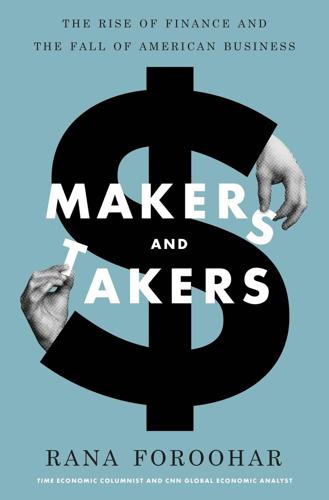
Makers and Takers: The Rise of Finance and the Fall of American Business
by
Rana Foroohar
Published 16 May 2016
These tactics are particularly common in sectors like finance, technology, and pharmaceuticals—that is, intellectual-property-driven industries in which the virtual nature of assets (ideas, formulas, patents, algorithms, and the like) makes it especially easy to shift profits to the cheapest possible tax jurisdiction, regardless of where they really came from. Ever hear of a double Irish? How about a Dutch sandwich? These aren’t cocktails or bar snacks but rather complex financial strategies used by many American companies to transfer profits they earn abroad to countries with the lowest tax rates. Despite the goofy nicknames, these techniques have a serious and nefarious purpose: to keep money away from the United States whenever possible so as to avoid paying the higher corporate tax rates in effect at home.
…
According to a source who attended that meeting and spoke to me off the record, one of the radical ideas attendees bounced around envisioned companies writing checks to social media users, based on how much their data streams are monetized by these firms.8 But in terms of how to reward makers over takers, tax reform remains the largest and most immediate fight. The US code is ripe for an overhaul, in both the corporate and the consumer sphere. Tax inversions, Dutch sandwiches, and Cayman Islands wizardry that expatriate the gains of American corporations to enrich a tiny managerial caste suggest a whole new genre of selfish capitalism. As this book has attempted to illustrate, globalization and financialization, working hand in hand, allow firms to fly thirty-five thousand feet over the problems of both individual nations and people, who are all too familiar with the reality on the ground: an economy in which wages still aren’t rising fast enough, good middle-class jobs remain hard to come by, and public deficits remain large, since the private sector won’t spend on real-economy investments to fill the void.
…
American firms do a lot of this, redirecting to the most tax-advantageous country the intellectual property that may have been the work of many people in many countries. Basically, this strategy funnels the profits from the knowledge economy, where the innovation actually occurred, to a different economy that offers the cheapest cash haven. Firms can go further and add a “Dutch sandwich” onto this maneuver. Because there are European Union tax agreements in place that allow money to move freely between EU countries, American firms can set up Dutch subsidiaries and transfer more money from more countries into Irish subsidiaries. The whole thing creates a global race to the bottom, which underscores one of the key problems of tax avoidance: the so-called “tragedy of the commons” where, in the end, everyone loses.
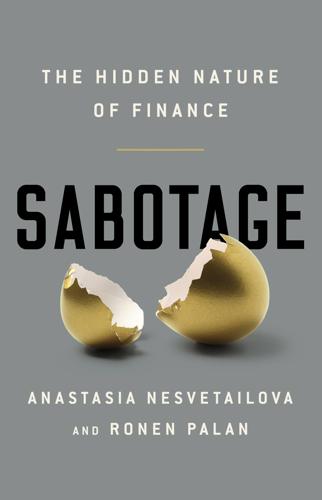
Sabotage: The Financial System's Nasty Business
by
Anastasia Nesvetailova
and
Ronen Palan
Published 28 Jan 2020
In fact, Ireland is so central to international financial opacity that it lends its name to a highly-sought-after product: a double Irish sandwich. The ‘sandwich’ refers to an accounting and tax scheme which allows companies to avoid taxation. Since the late 1980s it has been mostly been used by US multinationals to avoid corporate taxation on all non-US profits. Historically, Double Irish is the largest tax avoidance tool. It has enabled US companies to shield around $100bn annually from taxes. Double Irish has often been paired with the Dutch Sandwich – another tax avoidance instrument. Although the US authorities were aware of the scheme, it was the EU that in October 2014 forced Ireland to close the scheme, with effect from January 2015.
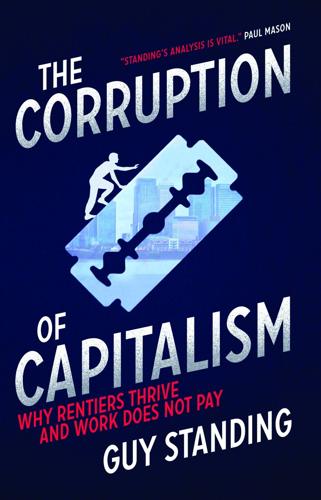
The Corruption of Capitalism: Why Rentiers Thrive and Work Does Not Pay
by
Guy Standing
Published 13 Jul 2016
Whatever their legality, these schemes are a means by which firms obtain substantial rental income. Even more egregiously, some multinationals have exploited anomalies in the tax rules of different jurisdictions, using devices such as Google’s famous ‘Double Irish with a Dutch sandwich’ to move profits to tax havens such as Bermuda where the corporate tax rate is zero. In 2011, nineteen subsidiaries registered in Ireland used the ‘Double Irish’ to avoid tax on €33 billion of profits, equivalent to a fifth of the country’s economic output that year. Perhaps the biggest source of corporate tax avoidance is the parking of profits offshore by US companies, induced by the US tax system.
…
But companies can still claim a reduced rate on patents they have bought in or that arise from outsourced research. France, Luxembourg, Spain, Portugal, Italy and the Netherlands (which has a concessionary rate of just 5 per cent) are among countries that operate a patent box. Ireland, which under pressure closed a related tax-dodging loophole known as the ‘Double Irish’, is introducing a patent box with a concessionary rate of 6.25 per cent. The ostensible purposes of patent boxes are to encourage firms to do more research and to attract ‘knowledge-intensive’ multinationals. But they are in reality another beggar-my-neighbour subsidy that leaves no one better off except the corporations.
…
W. 1, 2 buy-to-let mortgages 1, 2 Cadbury 1 Calmard, Pierre 1 Cameron, David 1, 2, 3, 4, 5, 6 Campaign for Better Transport 1 Cancer Fund of America 1 CAP (Common Agricultural Policy) 1, 2 Capita 1 Capital in the Twenty-First Century 1, 2 Care UK 1 Carlyle Group 1 Carlyle, Thomas 1 Carnegie Institute 1 Carney, Mark 1, 2 Cato Institute 1 Caxton Associates 1 Cerberus 1, 2 CERN (European Organization for Nuclear Research) 1 CETA (Comprehensive Economic and Trade Agreement) 1 charities/charitable donations 1, 2 Charter of Liberties (1215) 1, 2 Charter of the Forest (1217) 1, 2, 3, 4 Chen, Edward 1 Chernukhin, Vladimir 1 Cheshire, Sir Ian 1 Chicago school 1, 2 China Investment Corp. 1 Christensen, Clayton 1 churches 1 circuits of power 1 Citizens Advice 1 Citizens for Tax Justice 1, 2 Citizens UK 1 Citizens United 1 civil commons 1 Clare, John 1 Clickworker 1 climate change 1, 2, 3, 4 Clinton, Bill 1, 2, 3 Clinton, Hillary 1, 2, 3, 4 cloud labour 1 ‘cognitive capitalism’ 1 Coke, Edward 1 collective bargaining 1, 2, 3 Commissioning Support Industry Group 1 commodification 1, 2, 3, 4, 5, 6, 7, 8, 9, 10, 11, 12 Commodity Futures Trading Commission 1 commons 1 and allotments 1 civil commons 1 commodification of 1, 2, 3, 4, 5, 6, 7, 8, 9 and ‘contrived scarcity’ 1, 2, 3 cultural commons 1 and enclosure 1, 2, 3 and Hartwick’s Rule 1, 2, 3, 4 intellectual commons 1 and Lauderdale Paradox 1 and neo-liberalism 1, 2, 3, 4, 5, 6, 7 and precariat 1, 2, 3, 4, 5 revolt of 1, 2, 3, 4, 5 and privatisation 1, 2, 3, 4, 5, 6, 7, 8, 9 social commons 1 spatial commons 1, 2 and universal justice 1 Commons Act (1876) 1 Commons Preservation Society 1 comparative advantage 1, 2 Competition and Markets Authority 1 ‘competitiveness’ concept 1, 2, 3, 4, 5, 6, 7 ‘concierge’ economy 1 Congressional Budget Office (US) 1 Constitution (US) 1 ‘contrived scarcity’ 1, 2, 3, 4, 5 copyright 1, 2 Copyright Act (US, 1790) 1 Corbyn, Jeremy 1 Corporate Europe Observatory 1 corporate welfare 1 corporation tax 1, 2, 3, 4, 5, 6, 7, 8, 9, 10 Couchsurfing 1 Coulson, Andy 1 County Smallholdings Estate 1 ‘credentialism’ 1 ‘creditocracy’ 1 Crime and Disorder Act (1998) 1 ‘crony capitalism’ 1, 2, 3, 4, 5 Crosby, Lynton 1, 2 Crowdcube 1 CrowdFlower 1, 2, 3 crowdfunding 1, 2 crowd-sourcing 1 ‘crowdwork’ platforms 1 cultural commons 1 Cup Trust 1 Daily Mail 1, 2, 3 Daily Mirror 1 Daily Star 1 Daily Telegraph 1 Darling, Alistair 1 ‘data exclusivity’ 1 ‘deadweight effect’ 1 debt and austerity 1, 2, 3 and banking systems 1, 2, 3, 4, 5 cancellation of 1 as exploitation 1 household debt 1, 2, 3, 4 housing debt 1 and mental health 1 platform debt 1 and precariat 1, 2 and predatory creditors 1 public and private 1, 2 and rentier capitalism 1, 2, 3, 4, 5, 6, 7 and securitisation 1, 2 and social policy 1 student debt 1, 2 and tax breaks 1 ‘debt overhang’ 1 deindustrialisation 1, 2, 3 democracy and banking systems 1, 2, 3, 4, 5, 6, 7 circuits of power 1 commodification of 1, 2 and education 1 and Goldman Sachs 1 lobbying 1, 2 and media 1, 2 and Mont Pelerin Society 1, 2 and neo-liberalism 1, 2, 3 party politics 1 and plutocracy 1, 2, 3, 4, 5 political consultancy 1 and precariat 1, 2 and privatisation 1 and rentier capitalism 1, 2, 3, 4, 5, 6, 7 and revolt of precariat 1, 2 ‘thinning’ of 1 Desmond, Paul 1 Didi Kuaidi 1 digital platforms see rentier platforms direct subsidies 1 Discipline and Punish 1 Disney 1, 2 ‘distress’ debt 1 Doha Round 1, 2 ‘Double Irish’ 1, 2 Draghi, Mario 1, 2, 3 Drutman, Lee 1 Dudley, William 1 Duncan Smith, Iain 1 Dutch Disease 1 ‘earnings stripping’ 1 Easton, Jim 1 easyCar Club 1 eBay 1 EBRD (European Bank for Reconstruction and Development) 1, 2 Economist, The 1, 2, 3, 4, 5, 6, 7, 8, 9 Ecosystem Markets Task Force 1 education 1, 2, 3, 4, 5, 6, 7 Edward I, King 1 Einaudi, Luigi 1 Einstein, Albert 1 EITC (Earned Income Tax Credit) 1 Electoral Commission 1, 2 Elizabeth II, Queen 1 Elsevier 1 enclosure 1, 2, 3 Encore Capital 1 ‘entrepreneurial’ debt 1 Equity Lifestyle Properties 1 Erhard, Ludwig 1 EU membership referendum (2016) 1, 2 European Central Bank (ECB) 1, 2, 3, 4, 5, 6 European Patent Office 1 ‘euthanasia’ of rentiers 1, 2, 3, 4, 5, 6, 7 Evening Standard 1 ‘ever-greening’ 1 exchange value 1, 2, 3 Facebook 1, 2 Faraday, Michael 1 Farmer, Michael 1 ‘Faustian bargain’ 1, 2, 3 FDA (Food and Drug Administration) 1 Federal Reserve 1, 2, 3, 4, 5, 6 Feinberg, Stephen 1 Financial Services Authority 1 Financial Times 1, 2, 3, 4, 5, 6, 7 Fisher, Sir Antony 1 Fitzgerald, F.
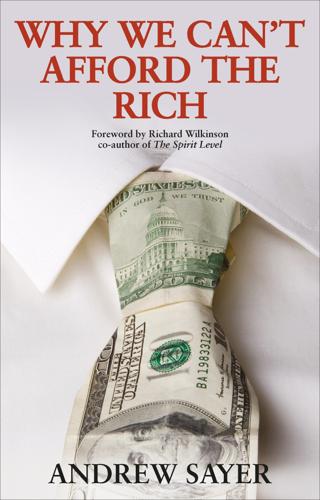
Why We Can't Afford the Rich
by
Andrew Sayer
Published 6 Nov 2014
While the little people pay their taxes for all these things and more, many incredibly wealthy companies free-ride on them. The double Irish and the Dutch sandwich Google’s sixth ‘core value’ is: ‘Do the right thing: don’t be evil. Honesty and Integrity in all we do. Our business practices are beyond reproach. We make money by doing good things.’64 Google cut its taxes by US$3.1 billion, using a technique that moves most of its foreign profits through Ireland and the Netherlands to Bermuda. These strategies, known to lawyers as the double Irish and the Dutch sandwich, helped Google to reduce its overseas tax rate to 2.4%.65 Margaret Hodge, who chairs the UK parliament’s Public Accounts Committee, took Google’s UK Vice-President, Matt Brittin, to task over this: ‘You are a company that says you “do no evil”.
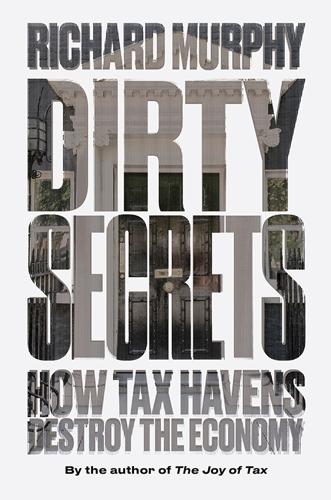
Dirty Secrets How Tax Havens Destroy the Economy
by
Richard Murphy
Published 14 Sep 2017
It has secured international notoriety by exploiting double tax agreements to let royalties on copyrights and patents, dividends, and capital gains flow through it in a way that ensures tax charges are minimised. So successful has this been that the head offices of many US-owned European entities are located there, and tax abuse has been widely reported: Google, with its so called ‘Dutch Sandwich’, is the most obvious example. Luxembourg competes with the Netherlands for this business. Secrecy Jurisdictions The very diversity of tax havens, however, has caused all sorts of problems for those trying to tackle the issues to which they give rise. This is why some tax havens have in recent years been re-categorised as secrecy jurisdictions (see Chapter 2).
…
It should be noted that this survey was inspired by work I had previously undertaken, but was more comprehensive. 16.OECD, ‘Table II.1 Corporate Income Tax Rate’, at stats.oecd.org. 17.OECD, ‘Transfer Pricing: Keeping It at Arm’s Length’, OECD Observer 230 (January 2002), at oecdobserver.org. 18.House of Commons Committee of Public Accounts, ‘Tax avoidance: the role of large accountancy firms’, Forty-fourth Report of Session 2012-13 19.A valuable critique is available at All-Partyt Parliamentary Group: Responsible Tax, ‘Response from: BEPS Monitoring Group’, 21 January 2015, at appgresponsibletax.org.uk. 20.For an example, see Leonid Bershidsky, ‘Goodbye Double Irish, Hello Knowledge Box’, 15 October 2015, at bloomberg.com. 21.Richard Rubin, ‘US Companies Are Stashing $2.1 Trillion Overseas to Avoid Taxes’, Bloomberg.com, 4 March 2015, at bloomberg.com. 22.Alison Smith, ‘Corporate Cash Piles Escape Osborne’s Gaze’, Financial Times, 18 March 2015. 23.KMPG, ‘Corporate Tax Rates Table, at home.kpmg.com. 24.Department of Finance, Republic of Ireland, ‘Effective Rates of Corporation Tax in Ireland: Technical Paper, April 2014’, pdf at budget.gov.ie. 25.R.
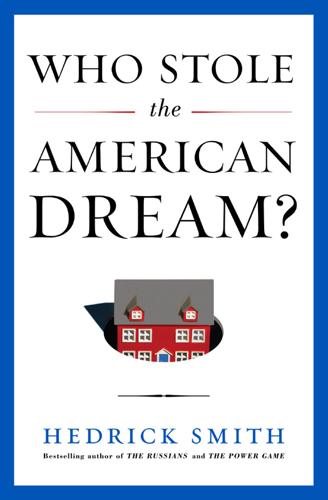
Who Stole the American Dream?
by
Hedrick Smith
Published 10 Sep 2012
They can allocate their profits on lucrative patents on iPads and iPhones to their overseas operations or they can sell software applications from low-tax countries overseas, shifting around tens of billions in income from country to country with legal but cleverly devised bookkeeping to avoid taxes in the United States and in other countries, too. Earlier this year, The New York Times reported that Apple had pioneered an accounting technique known as the “Double Irish with a Dutch Sandwich,” which cut Apple’s taxes drastically by routing profits through Irish subsidiaries to the Netherlands and then to the Caribbean. Today, hundreds of other U.S. corporations have copied tactics invented by Apple, which, in 2011, paid only $3.3 billion in taxes on $34.2 billion in profits.
…
Corporate Tax Code,” The New York Times Online, January 27, 2011; Binyamin Appelbaum, “Corporate Taxes: More Winners and Losers,” The New York Times Online, January 27, 2011; “Analysis: 12 Corporations Pay Effective Tax Rate of Negative 1.5% on $171 Billion in Profits: Reap $62.4 Billion in Tax Subsidies,” Citizens for Tax Justice, June 1, 2011, http://www.ctj.org. 69 “Double Irish with a Dutch sandwich” Charles Duhigg and David Kocienieski, “How Apple Sidesteps Billions in Taxes,” The New York Times, April 29, 2012. 70 Paid only $3.3 billion in taxes on $34.2 billion in profits Ibid. 71 “Check the Box” Vanessa Houlder, Megan Murphy, and Jeff Gerth, “Tax Wars: The Accidental Billion-Dollar Break,” FT.Com Financial Times, September 27, 2011. 72 They lobby Congress for a “tax holiday” David Kocieniewski, “Companies Push for Tax Break on Foreign Cash,” The New York Times, June 19, 2011; Linnley Browning, “A One-Time Tax Break Saved 843 U.S.
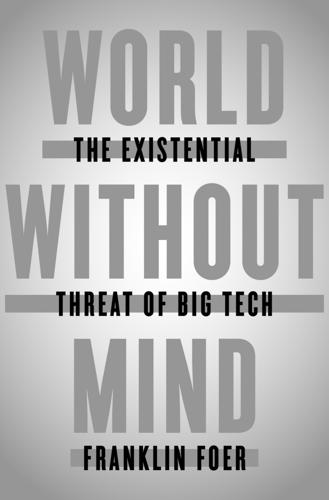
World Without Mind: The Existential Threat of Big Tech
by
Franklin Foer
Published 31 Aug 2017
The whole plot has irked the IRS, which has built a careful case against Amazon. Calculations by the IRS show that Project Goldcrest helped Amazon to dodge a bill of at least $1.5 billion that would otherwise have been paid to the U.S. government. Google has the same sort of unpatriotic accounting schemes. It prefers maneuvers known as the Double Irish and the Dutch Sandwich. Google has also shifted assets to Bermuda, that famous mecca of high tech. By the end of 2015, it had “permanently reinvested” $58.3 billion of its profits in foreign tax havens, earnings on which it pays no U.S. tax. The tech companies maintain every shred of data, yet seem to want to purge every bit of taxable earnings.
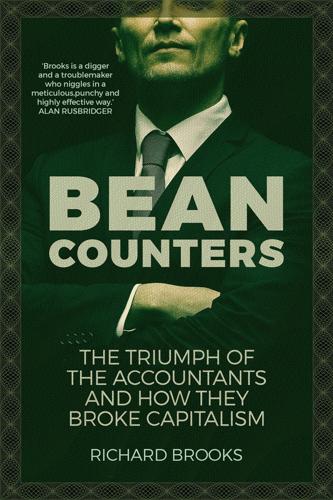
Bean Counters: The Triumph of the Accountants and How They Broke Capitalism
by
Richard Brooks
Published 23 Apr 2018
They manage this by paying royalties for using the genius behind their products to other Irish companies that own the relevant patents and know-how and claim to be tax-resident somewhere like Bermuda or the Caymans. The money usually flows through a Dutch company to avoid a ‘withholding tax’ on payments directly to a recognized tax haven. This is the infamous ‘Double Irish’ (with ‘Dutch sandwich’) scheme. It relies on multiple flaws in tax law of the sort that other countries have long corrected but with which Ireland determinedly persists. As Drucker discovered, with pressure on the Dutch government to stop functioning as a tax-avoidance conduit, in 2010 O’Rourke successfully lobbied for withholding taxes on royalties paid out of Ireland to be scrapped altogether.
…
INDEX Abadie, Richard, 189 Aberdeen, Scotland, 48, 70 ABN Amro, 138 Accenture, 71, 256, 272 Accounting Establishment, The, 80 accounting standards, 73, 123–5 aconter, 2 Adelphia, 109, 264 Adidas, 220 Airbus, 214–19 Aislabie, John, 40 algebra, 21, 33, 38 Almond, Steve, 139–40, 148 alumni system, 17 Amazon, 170, 171, 178 American Institute of Certified Public Accountants, 61 American International Group (AIG), 133–5, 144, 145, 148 American Steel and Wire Company, 55 Andersen, Arthur Edward, 72–4, 75, 77, 78 Anglo Irish Bank, 144 Anne, queen of Great Britain and Ireland, 39 antitrust laws, 59, 61, 75 Antwerp, 36 Appleby, 247 Applegarth, Adam, 126 Appleton, Robert, 225 Arabic mathematics, 3, 21–2 ArcelorMittal, 171 Arthur Andersen & Co., 72–4, 75, 77–8, 81, 97, 102–8, 112–13, 188 auditing, 4, 72–4, 85, 97, 102–8, 109, 117 collapse (2002), 5, 7, 11, 90, 108, 110, 121 and computing, 77–8 consultancy, 77–8, 79, 81, 103 and Enron, 4, 7, 11, 74, 102–8, 113, 117 global operations, 234 and HIH, 240 and Labour Party, 184, 188 and Lincoln Savings and Loan, 85 ‘One Firm’ philosophy, 74, 275 and subprime mortgages, 112–13, 116 and Sunbeam, 97 and United States Steel, 62 and WorldCom, 109, 110 Arthur Young & Co., 63, 71, 85–7 asset-backed securities (ABS), 121 Associated Electrical Industries, 66 Aston Martin, 2 AT&T, 109 Atchison, Jack, 85–6 Atlantic Ocean, 39 Atter, Lewis, 197–8 Audit Company of Illinois, 72 auditing, 2, 5, 6, 10–16, 68–9, 79–80, 259–61, 276, 280–84 1960s ‘Go-Go’ era, 63–5, 67 1980s deregulation era, 85–91 1990s/2000s ‘numbers game’ era, 95–110, 114 2007–8 financial crisis, 4, 13–14, 17, 18, 90, 111–50, 210, 241, 256–9, 265 2010s post-crisis era, 259–61 Barnier proposals (2010), 253–5, 280 Davey committee (1894), 52 and class action, 92 Companies Act (1900), 52 competing on price, 79 compulsory rotation, 5 and consultancy, 82, 97–8 and corruption, 211–32 and deregulation, 85–7 expectations gap’, 65, 257 global operations, 235–46 and Joint Stock Companies Acts (1844, 1856), 47, 50 and Levitt, 96–8, 104 limited companies, 13 limited liability, 91–5, 114 Lincoln Savings and Loan, 85–6 Maxwell, 87–8 Medici system, 27 New York Stock Exchange, 55 public, 280–82 and Railway Regulation Act (1844), 45–7 Australia, 48, 51, 127, 170, 240 Avignon, France, 29 Avis Rent-a-Car, 59 Ayrshire, Scotland, 42 Babbage, Charles, 70 BAE Systems, 213–14, 219 Bagley, Gaenor, 268–71 Bahamas, 222, 236 Bain & Co., 263 Bainbridge, Guy, 141 Bank of America, 118 Bank of Credit and Commerce International, 91 Bank of England, 38, 91, 126, 273 Bank of Scotland, 140 Bank of Tokyo-Mitsubishi, 230–31 Bankia, 241 Banking Act (1879), 51 bankruptcy, 30, 45, 46, 49, 50–51 Barclays, 6, 121, 149, 256, 258 Baring Brothers, 92 Barkley, Alben, 58 Barlow, Ian, 181, 182 Barlow Clowes, 89–90, 136, 209 Barnes, David, 258–9, 276, 277 Barnier, Michel, 253–5, 280 Bass, Carl, 105–7 BCCI, 136 Bear Stearns, 121, 139, 145 Belfield, Gary, 192, 193 Benci, Giovanni, 27, 28, 29, 31 Bennett, Robert, 161 Berkshire Hathaway, 135 Bettel, Xavier, 170 Bevis, Herman, 62 Big Bang (1986), 156 Big Eight, 62, 80, 81, 82, 86, 87, 89, 136, 235, 283–4 Big Five, 95, 97, 236 Big Four, 2, 5–21, 110, 114, 283–4 alumni system, 17 auditing, see under auditing business advisory, 114 charity, 16–17 client relationship partners, 12 compulsory rotation, 5 consultancy, 6, 10–12, 114, 183–210, 261–7 and corruption, 211–32 cyber-security, 272–3 export earnings, 6 federal structure, 7–8 and financial crisis (2008), 111–50 global operations, 235–52 governments, advice to, 6, 180, 183–210, 248–50 growth, 9, 10 integrated reporting, 18 key performance indicators, 12 mark-to-model, 124 and media, 7 partners, 8, 11, 14, 15, 16 professional services, 11 recruits, 14–15 revolving door, 206–8, 272 and scandals, 7–8 and securitization, 121–3 tax avoidance, 156–82, 246–8 thought leadership, 12 Big Short, 112 Big Six, 81, 91–3, 95, 235, 236 Big Three, 110, 161 bills of exchange, 25, 26 Birmingham, West Midlands, 43 Bischoff, Winfried, 209 Black, Conrad, 154–5 Black, William, 60–62 Blackbeard (Edward Teach), 39 Blair, Anthony ‘Tony’, 184, 188, 191, 213 Blatter, Joseph ‘Sepp’, 221, 222, 225–8 BLIPS (Bond Linked Issue Premium Structures), 159–62, 181 Blockbuster, 106 Blunt, John, 39, 44 Board of Trade, 45 Book of Disquiet (Pessoa), 1 Book-keeping Methodiz’d (Mair), 53 Booz & Co., 264 Boston Consulting, 191 Boulton, Matthew, 43 Bower, Marvin, 75 Boy Scouts of America, 149 Bradford & Bingley, 141–2, 149 Brazil, 220, 238, 239, 242–3, 246 Breedon, Richard, 154 Brexit, 195, 203–4, 273 bribery, 211–28, 240 BRIC (Brazil, Russia, India and China), 238 Bristol, England, 49 Britannia Building Society, 142 British Academy, 111–12 British Aerospace, 212–14, 219 British Airways, 148 British American Tobacco, 148 British Broadcasting Corporation (BBC), 169, 197, 220 British Empire, 233 British Home Stores (BHS), 260–61 British Virgin Islands, 213, 220, 246 Britnell, Mark, 192–3, 208 Brown, Gordon, 157, 184, 185, 186, 196 Bruges, 31 BT, 149 Bubble Act (1720), 44 Budgetary Control (McKinsey), 74–5 Buffett, Warren, 63, 135 Building Public Trust Awards, 256 Bureau d’Imposition Sociétés VI, 168 Bureau of Supplies and Accounts, US Navy, 77 Burgundy, Duchy of (1032–1477), 31 Bush, George Walker, 98, 114, 145, 253 Bush, Tim, 126, 127, 147 Butler, Stephen, 181 Byrne, Liam, 184 Byzantine Empire (285–1453), 21 Cabinet Office, 200, 201 Cable & Wireless, 215 Caesar, John, 54, 55, 56 Calcutta, India, 233 Cambridge, Cambridgeshire, 194 Cambridge University, 55, 268 Cameron, David, 192, 195, 203 Campaign Against the Arms Trade, 265 Canada, 246 Canary Wharf, London, 256 Cape Coast Castle, Gold Coast, 37 Capita, 201–2 capital, 3 Carell, Steve, 112 Caribbean Football Union, 221, 223, 224, 225 Carnegie, Andrew, 55, 71 Carter, Arthur, 58 Cash Investigation, 168, 171 Caterpillar, 178 Catholic Church, 3, 24–5, 26, 29, 34, 38 Cattles plc., 142 Causey, Rick, 104 Cayman Islands, 104, 164, 214, 239, 246, 247 Celanese, 60 Celler–Kefauver Act (1950), 59, 61 Celluloid Corporation, 60 certified public accountants, 53 CFO, 101, 109 Chaplin, Charlie, 71 Chappell, Dominic, 260 Charles the Bold, Duke of Burgundy, 31 chartered accountancy, 14, 16, 45, 47–8, 49, 53 Chelsea Flower Show, 200 Chicago School, 84–5, 183 Chicago Sun-Times, 154 Chicago, Illinois, 54, 72–4, 101, 105 child labour, 44 China, 17, 111, 204, 238, 243–5, 251–2, 272, 274 China Integrated Energy, 244 Chirac, Jacques, 127 Christianity, 3, 24–5, 26, 34, 35, 38 Catholicism, 3, 24–5, 26, 29, 34, 38 Protestantism, 3, 42, 43 Christoffels, Jan Ympyn, 36 Churchill, John, 1st Duke of Marlborough, 41 Circle Health, 194 Citigroup, 149, 258 City of Glasgow Bank, 51, 147 City of London, 46, 49, 156, 249 Civil Rights Movement, 64 Claridges, London, 122 Clarke, Charles, 207 class-action lawsuits, 64–5, 92 Cleese, John, 15 climate change, 18 CloseMore University, 115 Clowes, Peter, 88–90, 91, 136, 209 Co-operative Bank, 142, 149, 150 Cohen, Manuel ‘Manny’, 80 Cold War, 95 Cole, Margaret, 208 Colin, Bernard, 173 collateralized debt obligations (CDOs), 120–21, 129–30, 133, 136–40, 265 Collier-Keywood, Richard, 182 Collins, Simon, ix, 11, 204, 218, 255–9, 264–7, 276, 277–8, 279 Colombia, 229 colonialism, 37 Comey, James, 161 commercial-mortgage-backed security (CMBS), 121 common accounting standards, 73, 123–5 common law, 39 Companies Act 1862: 51 1900: 52 1929: 58 1948: 66 1989: 93 compulsory rotation, 5 computing, 77–8 Comroad, 240 conflicts of interest, 18, 60, 82, 91, 98, 187, 254–5 Arthur Andersen & Co., 73–4, 78, 105, 277 and Barnier proposals, 254–5 in China, 274 and data, 271 Deloitte, 241 KPMG, 202, 228 Price Waterhouse & Co., 73, 277 PricewaterhouseCoopers (PwC), 143 and Sarbanes–Oxley Act (2002), 122 Connolly, John, 89–90, 136, 137, 139, 146, 148, 150, 201 Conservative Party, 95, 185, 186 consultancy, 6, 10–12, 69, 70–83, 97, 114, 183–210, 261–7, 284–5 Continental Baking, 59 Continental Bank, 101 convergence, 123 Cook, Martin, 16 ‘cooking the books’, 36 Cooper, Cynthia, 109 Cooper, William and Arthur, 49 Coopers & Lybrand, 49, 56, 65, 87–8, 95, 185, 216 Coopers Brothers, 87 Copeland, James, 239 Corbyn, Jeremy, 201 Cornwall, England, 43 corruption, 211–32, 240 cost accounting, 42–4, 70–71, 76 cost–profit calculus, 3 Cotswolds, England, 26 Countrywide Financial Corporation, 48, 118, 257 Court of Appeal, 211 credit default swaps (CDSs), 120, 122, 134–5 credit rating agencies, 130, 149 Cruickshank, David, 166 Crystal Park, Luxembourg, 170 Cuba, 239 Cuomo, Andrew, 133 currency swaps, 156–7 cyber-security, 272–3 Daily Mirror, 88 Daniel, Vincent, 112–13 Dante, 33 Dassler, Horst, 220 Datini, Francesco di Marco, 25 Davey, Horace, Baron Davey, 52 Davos, see World Economic Forum Defoe, Daniel, 38 DeLany, Clarence Martin, 72 Delaware, United States, 8, 57, 92, 236, 284 Deloitte, 2, 5, 8, 12–13, 82, 90, 98, 276, 277 and Adelphia, 109 and bankers’ bonuses, 158 and Bankia, 241 in Brazil, 242–3 Brexit memo (2017), 195, 203 charity, 16–17 in China, 244, 251–2 client relationship partners, 12–13 cyber-security, 272 and Deutsche Bank, 158 dot after name, 12 and Duke Energy, 109 and Financial Crisis Inquiry Commission, 145 Global Impact Report, 17 global operations, 236 and Gol, 242–3 government, advice to, 187, 189, 190, 191, 193, 194 and GPT, 216 and Hong Kong protests (2014), 251–2 and House of Lords committee (2010), 146 integrated reporting, 18 Journey Declaration, 275 and National Health Service (NHS), 193, 194 and Parmalat, 239, 243 and private finance initiative (PFI), 187, 189, 190, 191, 203 and Public Company Accounting Oversight Board (PCAOB), 145 revolving door, 207, 208 and Royal Ahold, 238–9 and Royal Bank of Scotland, 47, 90, 136–40, 142, 147, 241, 259 and securitization, 121 and Standard Chartered Bank, 230 and tax avoidance, 157, 158, 166, 203 and technology, 271 and thrifts, 87 and World Economic Forum, 18 Deloitte, Haskins & Sells, 89 Deloitte, William Welch, 46–7, 49, 158 Deloitte & Touche, 89, 91, 136–40 Deloitte Touche Tohmatsu, 239 Deltour, Antoine, 166–8, 171, 173–4, 175, 175 Democratic Party, 58, 80, 159 Deng Xiaoping, 243 Department for Business, UK, 201 Department for Exiting the EU, 204 Department of Health, UK, 188, 191, 192 Department of Justice, US, 144, 161, 223 deregulation, 84, 85, 95, 112, 163, 273–4 derivatives, 117, 119–23, 125, 129–31, 133–40, 148, 265 Desmond, Dermot, 163 Deutsche Bank, 158, 166, 258 Deutsche Treuhand-Gesellschaft, 235 Devon, England, 73 Dickinson, Arthur, 55, 62, 73, 82 DiPiazza, Sam, 242 dirty pooling, 63 discrezione, 26, 29 Disney, 171 Dissenters, 43 dividends, 31, 39, 45 Donovan, John, 116–17 Doty, James, 260 ‘Double Irish’ scheme, 164 double-entry bookkeeping, 3–4, 6, 18, 22–41, 42–4, 96 Bank of England, 38 and Catholicism, 24–5, 26, 29, 34 Christoffels, 36 East India Company, 37 Goethe, 235 Japan, 235 Medicis, 26–32, 36 Pacioli, 32–6, 100, 124 and Protestantism, 42 Royal African Company, 37 South Sea Company, 39–41, 42 Washington, 53 Watt, 42–3, 44 Wedgwood, 43, 44 Dow Jones, 5, 95 Drucker, Jesse, 164, 165 drug trafficking, 229, 231 Dublin, Ireland, 163 Duke Energy, 109 Duncan, David, 103–4, 105, 106, 107, 108 Duranton International Ltd, 214 EADS, 216 East India Company, 37 Economist, The, 67, 238 EDF (Électricité de France), 205 Edinburgh, Scotland, 54 Edinburgh Society of Accountants, 47 Edison, Thomas, 55 Edward IV, king of England, 30 Edward VII, king of the United Kingdom, 68 Egypt, 21 Einzelunterschrift, 221 Eisenhower, Dwight, 76 Eisman, Steve, 112 Electronic Data Systems, 82 Elizabeth II, queen of the United Kingdom, 111–12 Elkind, Peter, 101 Ellis, Kevin, 256, 258 Enfield rifles, 71 England Bank of England, 38 East India Company, 37 Royal African Company, 37 slave trade, 37 Wars of the Roses (1455–1487), 30 woollen industry, 26, 30 see also United Kingdom Ennis, Jessica, 196 Enron, 16, 40, 99–108, 110, 130, 186, 190, 209, 221, 240, 261, 264 and Arthur Andersen & Co., 4, 7, 11, 74, 102–8, 113, 117 and consultancy arms, sale of, 262 and mark-to-market, 99–102, 113 and regulation, 6, 10, 122, 162, 222, 274, 279 Ernst & Ernst, 63, 71, 87 Ernst & Whinney, 86, 87 Ernst & Young, 2, 56, 91, 97, 132–3, 148–9 alumni system, 17 and Anglo Irish Bank, 144 Arthur Andersen structured finance purchase (2002), 121 ‘Building a Better Working World’, 12 and Civil Service Awards, 200 and Financial Crisis Inquiry Commission, 145 global operations, 236 government, advice to, 180, 187, 199, 202 and HealthSouth, 109 and Hong Kong protests (2014), 251–2 integrated reporting, 18 in Japan, 240–41 and Lehman Brothers, 12, 13, 132–3, 145, 148–9 and limited liability partnerships, 94, 95 and Lincoln Savings and Loan, 86–7 mark-to-model, 124 Panama Papers scandal (2016), 247 and private finance initiative (PFI), 187 and Public Company Accounting Oversight Board (PCAOB), 144–5 ‘Quality in Everything We Do’, 12 revolving door, 206, 207, 208 and securitization, 121 and Sino-Forest, 244 Tate sponsorship, 16 and tax avoidance, 7, 156–7, 162, 180, 182, 246, 247 tax policy development team, 180, 199 thought leadership, 12 and VAT avoidance, 7 and Warner, 224 Weinberger’s leadership, 17–18 and World Economic Forum, 17 European Central Bank, 10 European Commission, 170, 253–5, 268, 280 European Union (EU), 168, 170, 203, 253–5 eurozone, 273 Evans, Jonathan, 207 Evening Standard, 256 Everson, Mark, 159 executive pay, 76 ‘expectations gap’, 65, 257 ‘Eye of the Tiger’ (Survivor), 103 Facebook, 164 fair value, 123–5, 126 Fairhead, Rona, 230 Faisaliah Tower, Riyadh, 217 Falcon 900 jets, 100–101 Farah, Mohamed ‘Mo’, 196 Farrar, Michael, 208 Fastow, Andrew, 101–3, 104–5, 108, 109 Federal National Mortgage Association (‘Fannie Mae’), 118–19, 145, 257 Federal Reserve, 122, 133 Federal Trade Commission, 79 Fiat, 170 Fibonacci, Leonardo, 21–2, 32 FIFA (Fédération Internationale de Football Association), 219–28 Fife, Scotland, 48 Financial Conduct Authority, 140, 149, 281 financial crisis (2007–8), x, 4, 7, 10, 13–14, 18, 111–50, 210, 253, 256–9, 265 American International Group bailout, 133–5, 144, 145, 148 Anglo Irish Bank bailout, 144 Bear Stearns bailout, 139, 145 and China, 111 Fannie Mae crisis, 118–19, 145, 257 HBOS bailout, x, 140–41, 142–3, 149, 257 Lehman Brothers collapse, 12, 13, 92, 131–3, 138, 144, 145, 148–9 and IAS39 rules, 123–5, 126, 127, 147 and mark-to-market, 129–31 New Century Financial Corporation collapse, 115–18, 257 Northern Rock collapse, 125–9, 142–3, 148 Royal Bank of Scotland bailout, 47, 136–40, 142, 241 and securitization, 119–23, 129–31, 133–40, 265 and subprime mortgages, x, 10, 36, 48, 111–22, 126, 130, 133, 136, 142, 274 Washington Mutual collapse, 145 Financial Crisis Inquiry Commission, 134, 135, 144, 145 Financial Reporting Council, 138, 142, 144, 149, 182, 209–10, 213–14, 259, 261 Financial Services Authority, 127, 128, 137, 138, 140 Financial Times, 17, 94, 169, 275 Finland, 246 First World War (1914–18), 71 Flint, Douglas, 229 FLIP (Foreign Leveraged Investment Program), 159, 162, 181 Florence, Republic of (1115–1532), 16, 21, 25, 26–32 Flynn, Timothy, 149 Ford, 71, 181 Ford, Henry, 71 Fortune, 62 fossil fuels, 18 Foul!
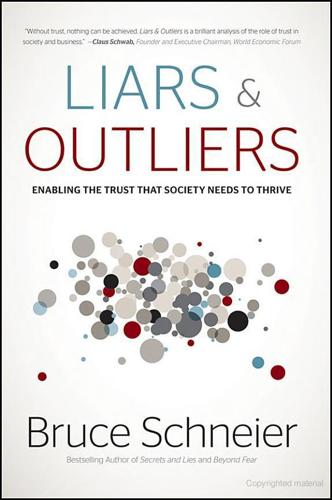
Liars and Outliers: How Security Holds Society Together
by
Bruce Schneier
Published 14 Feb 2012
This can happen by accident, when laws are linguistically ambiguous, contain simple errors, or fail to anticipate some new technological development. It can also happen deliberately, when laws are miswritten to enable the skillful few to evade them. Examples of accidental loopholes are the “Double Irish” and “Dutch Sandwich” loopholes that allow multinational corporations to avoid U.S.—and other—taxes.14 It's how Google pays only 2.8% of profits in tax. One estimate claims the U.S. loses $60 billion per year in taxes this way. Another loophole allows large paper mills to claim $6 billion in tax credits per year for mixing diesel fuel in with a wood byproduct they already burn; the law with the loophole was intended to reduce the consumption of fossil fuels.15 A variety of loopholes make video games one of the most highly subsidized industries in the U.S.
…
And, as we've seen in Chapter 12, the person who is in charge of making this decision will do better personally if he ignores his own moral considerations and cooperates with his employer. Even worse, if the corporation doesn't maximize profits, it risks a shareholder lawsuit. Additionally, market competition encourages sellers to ignore moral pressure as much as they can. Imagine if you were in a corporate boardroom, discussing the Double Irish tax loophole and how it could save your company millions. After it has been explained how the maneuver is perfectly legal, and how other companies are doing it, how far do you think a “but it's immoral” argument is going to go? Even if you don't want to do it, if you don't and your competitors do, you'll be uncompetitive in the marketplace—reminiscent of the sports doping example from Chapter 10.
…
increasing the probability Mark Kleinman (2009), When Brute Force Fails: How to Have Less Crime and Less Punishment, Princeton University Press. conflicting evidence Nina Mazar and Dan Ariely (2006), “Dishonesty in Everyday Life and Its Policy Implications,” Journal of Public Policy & Marketing, 25:117–26. two Irish subsidiaries Joseph B. Darby III and Kelsey Lemaster (15 May 2007), “Double Irish More than Doubles the Tax Savings,” Practical US/International Tax Strategies, 11:2,11–16. bigger one opened up Todd Neeley (28 Mar 2011), “Pulp, Paper Companies Amend Tax Returns Actions Could Cost Taxpayers Billions of Dollars,” DTN: The Progressive Farmer. Chapter 10 someone was sentenced Barbara de Lollis (15 Sep 2010), “Woman Faces Three Months in Jail for Stealing Hotel Towels,” USA Today.
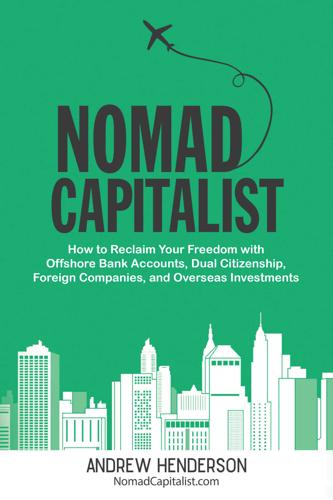
Nomad Capitalist: How to Reclaim Your Freedom With Offshore Bank Accounts, Dual Citizenship, Foreign Companies, and Overseas Investments
by
Andrew Henderson
Published 8 Apr 2018
Starbucks operates ten billion stores all over the world and has successfully shifted much of its revenue from those stores to subsidiaries in low-tax or tax-free countries by selling its intellectual property and other assets back to itself. Other restaurant chains and businesses do the same. You may have heard about the recently neutered Double Irish Dutch Sandwich, whereby companies like Facebook would shift money back and forth around Europe before finally parking it in Bermuda or some other speck in the Caribbean where taxes are low or nonexistent. Your business can do the same. Not only is it possible in certain cases to pay zero tax – unlike the 3% paid by companies like Starbucks – but you do not have to set up a network of subsidiaries all over the world and hang an org chart on your wall.
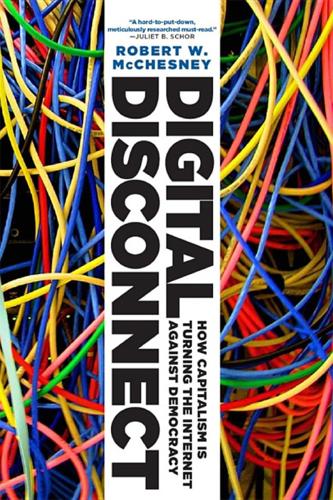
Digital Disconnect: How Capitalism Is Turning the Internet Against Democracy
by
Robert W. McChesney
Published 5 Mar 2013
There is a reason most people no longer accept that sort of sovereignty.”93 One test for how effective the U.S. government can be in regulating the digital giants will be the matter of taxation.94 Because of the fluid nature of the digital economy, Internet firms have been able to take advantage of the federal income tax code, devised for brick-and-mortar businesses, to move a disproportionate amount of their profits earned in the United States to accounts in foreign low-tax nations and dramatically reduce what they pay in taxes overall, in particular to the U.S. government. Nicholas Shaxson describes aspects of the process in his 2011 book, Treasure Islands: In October 2010 a Bloomberg reporter explained how Google Inc. cut its taxes by $3.1 billion in the previous three years through transfer pricing games known by names such as the “Double Irish” and the “Dutch Sandwich,” ending up with an overseas tax rate of 2.4 percent. The problem is getting worse. Microsoft’s tax bill has been falling sharply, for similar reasons. Cisco is at it. They are all at it. Transfer pricing alone costs the United States an estimated $60 billion a year—and that is just one form of the offshore tax game.95 Apple, for example, has pioneered sophisticated accounting techniques that—although probably technically legal—are extraordinarily damaging to U.S. tax revenues.
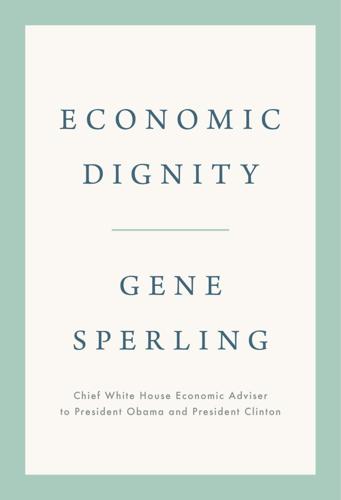
Economic Dignity
by
Gene Sperling
Published 14 Sep 2020
Yet countries like Ireland, the Netherlands, Bermuda, the Cayman Islands, and numerous others participate in the world’s greatest race-to-the-bottom competition with extremely low or nonexistent corporate taxation to attract corporate profits. These tax havens effectively put intense pressure on every other nation to cycle down their corporate tax rates or risk firms artificially shifting their profits to avoid paying taxes by using convoluted techniques with names like the “Double Irish with a Dutch Sandwich.” In 2015, 45 percent of the profits of multinational corporations based in the United States and other advanced economies were put on the books in tax havens. To be clear, the underlying economic activity generating those profits did not take place in the tax havens—it took place in the United States and other countries, using those countries’ advanced infrastructure, educated workforces, and legal systems that were paid for by those domestic taxpayers.
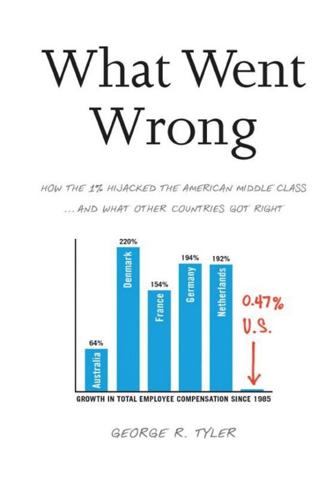
What Went Wrong: How the 1% Hijacked the American Middle Class . . . And What Other Countries Got Right
by
George R. Tyler
Published 15 Jul 2013
In 2010 and 2011, technology firms in the Standard & Poor’s 500 stock index reported an average global tax rate one-third less than the rest of the S&P according to a New York Times study.37 Apple had a tax rate of only 9.8 percent in 2011, saving some $2.4 billion in taxes, according to estimates by Martin Sullivan; it sloshed profits around the globe using tactics with names like the Double Irish with a Dutch Sandwich.38 A favorite haven is Luxembourg, where servicing tax dodgers accounts for up to one-half its national income.39 The profit on your Apple music or app downloads, for example, is recorded at a mail drop called iTunes S.àr.l. in Luxembourg. Oh, and that Apple product you bought in Berlin?
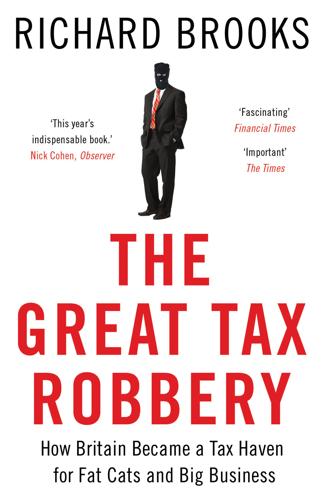
The Great Tax Robbery: How Britain Became a Tax Haven for Fat Cats and Big Business
by
Richard Brooks
Published 2 Jan 2014
Not only do British advertisers pay a low-taxed Dublin company for getting their name up first on Google searches but this company itself pays royalties for using the Google name to an Irish-registered but Bermuda-tax resident company.19 The payments go via a Dutch company interposed between these two companies in a ‘Dutch sandwich’ arrangement so that the money can leave Ireland tax free under the country’s tax treaty with the Netherlands, which then allows its onward tax-free transmission to the Atlantic tax haven. The effect is that, courtesy of none-too-demanding Irish corporate tax laws and generous international agreements, companies can dodge even Ireland’s low tax rate if they’re greedy enough.
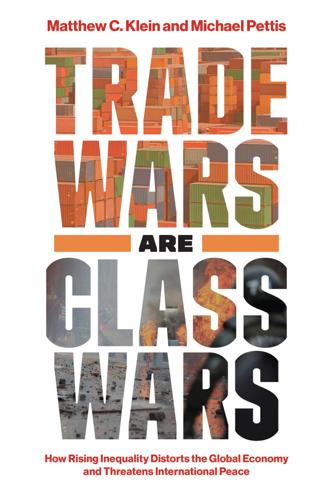
Trade Wars Are Class Wars: How Rising Inequality Distorts the Global Economy and Threatens International Peace
by
Matthew C. Klein
Published 18 May 2020
dataset=reg_area3&lang=en; Charlie Taylor, “Apple’s Secretive Cork Facility Opens Up—To an Extent,” Irish Times, January 11, 2018. 37. Kari Jahnsen and Kyle Pomerleau, “Corporate Income Tax Rates around the World, 2017,” Tax Foundation, Fiscal Fact No. 559, September 7, 2017; Robert W. Wood, “How Google Saved $3.6 Billion Taxes from Paper ‘Dutch Sandwich,’” Forbes, December 22, 2016. 38. Based on calculations from BEA data on direct investment and multinational enterprises, https://www.bea.gov/iTable/index_MNC.cfm; see also Matthew C. Klein, “What the Foreign Direct Investment Data Tell Us about Corporate Tax Avoidance,” Financial Times, November 23, 2017; and Gabriel Zucman, The Hidden Wealth of Nations (Chicago: University of Chicago Press, 2015). 39.

Exponential: How Accelerating Technology Is Leaving Us Behind and What to Do About It
by
Azeem Azhar
Published 6 Sep 2021
One loophole, long beloved by the American technology titans, was the ‘Double Irish’, in which large companies put their intangible intellectual property in an Irish-registered company controlled from a tax haven such as Bermuda. Ireland considers the firm to be offshore, but the US considers it Irish.50 And the profits? Well, the profits remain untaxed. This practice has started to go out of vogue, and after the Organisation for Economic Co-operation and Development (OECD) and Donald Trump’s administration clamped down on the Double Irish, at least one technology company brought it to an end in 2020.51 In general, governments have been caught off guard by the rapidity with which the Exponential Age titans have grown.
…
, arXiv:2009.10385 [cs.CY], 2020 <http://arxiv.org/abs/2009.10385> [accessed 30 March 2021]. 45 Michael Gofman and Zhao Jin, ‘Artificial Intelligence, Human Capital, and Innovation’, SSRN Electronic Journal, October 2019 <https://doi.org/10.2139/ssrn.3449440>. 46 Azeem Azhar, ‘Beneficial Artificial Intelligence: My Conversation with Stuart Russell’, 22 August 2019 <https://www.exponentialview.co/p/-beneficial-artificial-intelligence> [accessed 16 April 2021]. 47 Gofman and Jin, ‘Artificial Intelligence’. 48 Klinger, Mateos-Garcia and Stathoulopoulos, ‘A Narrowing of AI Research?’. 49 ‘A Tech CEO’s Guide to Taxes’, The Economist, 9 January 2021 <https://www.economist.com/business/2021/01/09/a-tech-ceos-guide-to-taxes> [accessed 21 March 2021]. 50 Vanessa Houlder, ‘Q&A: What Is the Double Irish?’, 2014 <https://www.ft.com/content/f7a2b958-4fc8-11e4-908e-00144feab7de> [accessed 24 March 2021]. 51 Richard Waters, ‘Google to End Use of “Double Irish” as Tax Loophole Set to Close’, 2020 <https://www.ft.com/content/991f11ae-2c51-11ea-bc77-65e4aa615551> [accessed 24 March 2021]. 52 Sanjana Varghese, ‘This Is Why Silicon Valley Giants Are Paying Such Low Taxes in the UK’, Wired, 12 October 2018 <https://www.wired.co.uk/article/facebook-uk-tax-bill> [accessed 14 October 2020]. 53 Lina M.
…
Abu Dhabi, UAE, 250 Acemoglu, Daron, 139 Acorn Computers, 16, 21 Ada Lovelace Institute, 8 additive manufacturing, 43–4, 46, 48, 88, 166, 169, 175–9 Adidas, 176 advertising, 94, 112–13, 116, 117, 227–8 AdWords, 227 aeroponics, 171 Afghanistan, 38, 205 Africa, 177–8, 182–3 Aftenposten, 216 Age of Spiritual Machines, The (Kurzweil), 77 agglomeration, 181 Air Jordan sneakers, 102 Airbnb, 102, 188 aircraft, 49–50 Alexandria, Egypt, 180 AlexNet, 33 Algeciras, HMM 61 Alibaba, 48, 102, 108, 111, 122 Alipay, 111 Allen, Robert, 80 Alphabet, 65, 113–14, 131, 163 aluminium, 170 Amazon, 65, 67–8, 94, 104, 108, 112, 122, 135–6 Alexa, 25, 117 automation, 135–6, 137, 139, 154 collective bargaining and, 163 Covid-19 pandemic (2020–21), 135–6 drone sales, 206 Ecobee and, 117 Go stores, 136 Kiva Systems acquisition (2012), 136 management, 154 Mechanical Turk, 142–3, 144, 145 monopoly, 115, 117, 122 Prime, 136, 154 R&D, 67–8, 113 Ami Pro, 99 Amiga, 16 Anarkali, Lahore, 102 anchoring bias, 74 Android, 85, 94, 117, 120 Angola, 186 Ant Brain, 111 Ant Financial, 111–12 antitrust laws, 114, 119–20 Apache HTTP Server, 242 Appelbaum, Binyamin, 63 Apple, 47, 62, 65, 85, 94, 104, 108, 112, 122 App Store, 105, 112, 115 chip production, 113 Covid-19 pandemic (2019–21), 222–3 data collection, 228 iOS, 85 iPhone, 47, 62, 85, 94, 105 media subscription, 112 watches, 112 APT33 hacker group, 198 Aral, Sinan, 238 Aramco, 108, 198 Armenia, 206–7 Arthur, William Brian, 110, 123 artificial intelligence, 4, 8, 31–4, 54, 88, 113, 249 academic brain drain, 118 automation, 125–42 data and, 31–2, 142 data network effect, 106–7 drone technology and, 208, 214 education and, 88 employment and, 126–7 healthcare and, 88, 103 job interviews and, 153 regulation of, 187, 188 arXiv, 59 Asana, 151 Asian Development Bank, 193 Aslam, Yaseen, 148 Assembly Bill 5 (California, 2019), 148 asymmetric conflict, 206 AT&T, 76, 100 Atari, 16 attack surfaces, 192–3, 196, 209, 210 Aurora, 141 Australia, 102, 197 automation, 125–42 autonomous weapons, 208, 214 Azerbaijan, 173, 206–7 Ballmer, Steve, 85 Bangladesh, 175 banking, 122, 237 Barcelona, Catalonia, 188 Barlow, John Perry, 184 Barrons, Richard, 195, 211 Bartlett, Albert, 73 batteries, 40, 51, 53–4, 250, 251 Battle of the Overpass (1937), 162 Bayraktar TB2 drone, 206 Bee Gees, 72 Bekar, Clifford, 45 Bell Labs, 18 Bell Telephone Company, 100 Benioff, Marc, 108–9 Bentham, Jeremy, 152 Berlin Wall, fall of (1989), 4 Bermuda, 119 Berners-Lee, Timothy, 55, 100, 160, 239 Bessen, James, 46 Bezos, Jeffrey, 135–6 BGI, 41 Biden, Joseph, 225 Bing, 107 biological weapons, 207, 213 biology, 10, 39, 40–42, 44, 46 genome sequencing, 40–41, 90, 229, 234, 245–7, 250, 252 synthetic biology, 42, 46, 69, 174, 245, 250 biopolymers, 42 bits, 18 Black Death (1346–53), 12 BlackBerry, 120 Blair, Tony, 81 Bletchley Park, Buckinghamshire, 22 blitzscaling, 110 Blockbuster, 138 BMW, 177 Boeing, 51, 236 Bol.com, 103 Bollywood, 181 Boole, George, 18 Bork, Robert, 114–15, 117, 119 Bosworth, Andrew, 233 Boyer, Pascal, 75 Boyle, James, 234 BP, 92, 158 brain, 77 Braudel, Fernand, 75 Brave, 242 Brazil, 202 Bremmer, Ian, 187 Bretton Woods Conference (1944), 87 Brexit (2016–20), 6, 168 British Broadcasting Corporation (BBC), 87, 129, 191 Brookings Institution, 130 BT, 123 Bulgaria, 145 Bundy, Willard Legrand, 149 Busan, South Korea, 56 business, 82, 92–124 diminishing returns to scale, 93, 108 economic dynamism and, 117 economies of scale, 50, 92 growth, 110–13 increasing returns to scale, 108–10 intangible economy, 104–7, 118, 156, 175, 180 linear value chains, 101 market share, 93–6, 111 monopolies, 10, 71, 94, 95, 114–24 network effect, 96–101 platform model, 101–3, 219 re-localisation, 11, 166–79, 187, 252, 255 state-sized companies, 11, 67 superstar companies, 10, 94–6 supply chains, 61–2, 166–7, 169, 175, 187, 252, 255 taxation of, 96, 118–19 Butler, Nick, 179 ByteDance, 28 C40 initiative, 189 Cambridge University, 127, 188 cancer, 57–8, 127 Capitol building storming (2021), 225 car industry, 93 carbon emissions, 35, 90, 251 Carlaw, Kenneth, 45 Carnegie, Andrew, 112 Carnegie Mellon University, 131 Catholic Church, 83, 88 censorship, 216–17, 224–6, 236 Central Intelligence Agency (CIA), 194 Cerebras, 34 cervical smears, 57–8 chemical weapons, 207, 213 Chen, Brian, 228 chewing gum, 78 Chicago Pile-1 reactor, 64 Chile, 170 China automation in, 127, 137 brainwave reading in, 152 Covid-19 pandemic (2019–21), 245 drone technology in, 207 Great Firewall, 186, 201 Greater Bay Area, 182 horizontal expansion in, 111–12 manufacturing in, 176 misinformation campaigns, 203 raw materials, demand for, 178 Singles’ Day, 48 social credit systems, 230 superstar companies in, 95 US, relations with, 166 chips, 19–22, 28–9, 48–9, 52, 113, 251 Christchurch massacre (2019), 236 Christensen, Clayton, 24 CIPD, 153 cities, 11, 75, 169, 179–84, 188, 255 Clegg, Nick, 225–6, 235 climate change, 90, 169, 187, 189, 251, 252 cloud computing, 85, 112 Cloudflare, 200 cluster bombs, 213 CNN, 185, 190 coal, 40, 65, 172 Coase, Ronald, 92 Coca-Cola, 93 code is law, 220–22, 235 cold fusion, 113–14 Cold War (1947–91), 194, 212, 213 collective bargaining, 147, 149, 154, 156, 162–5 Colombia, 145 colonialism, 167 Columbus, Christopher, 4 combination, 53–7 Comical Ali, 201 commons, 234–5, 241–3, 256 companies, see business comparative advantage, 170 complex systems, 2 compounding, 22–3, 28 CompuServe, 100 computing, 4, 10, 15–36, 44, 46, 249 artificial intelligence, 4, 8, 31–4, 54, 88 cloud computing, 85, 112 internet, 47–8, 55, 65, 84 Law of Accelerating Returns, 30–31, 33, 35 machining, 43 Moore’s Law, see Moore’s Law quantum computing, 35 transistors, 18–22, 28–9, 48–9, 52 conflict, 87, 189, 190–215 attack surfaces, 192–3, 196, 209, 210 cyberattacks, 11, 114, 140, 181, 187, 190–200, 209–14, 256 de-escalation, 212–13 drone technology, 11, 192, 204–9, 214, 256 institutional change and, 87 misinformation, 11, 191, 192, 200–204, 209, 212, 217, 225 new wars, 194 non-proliferation, 213–14 re-localisation and, 189, 193, 194, 209 consent of the networked, 223 Costco, 67 Coursera, 58 Covid-19 pandemic (2019–21), 12–13, 59, 78–9, 131, 245–9 automation and, 127, 135, 136 cities and, 183 contact-tracing apps, 222–3 gig economy and, 146 lockdowns, 12, 152, 176, 183, 246 manufacturing and, 176 misinformation and, 202–4, 247–8 preprint servers and, 60 recession (2020–21), 178 remote working and, 146, 151, 153 supply chains and, 169, 246 vaccines, 12, 202, 211, 245–7 workplace cultures and, 151, 152 cranks, 54 credit ratings, 162, 229 critical thinking skills, 212 Croatia, 145 Crocker, David, 55 crowdsourcing, 143–4 Cuba, 203 Cuban missile crisis (1962), 99, 212 cultural lag, 85 cyberattacks, 11, 114, 140, 181, 187, 190–200, 209–14, 256 CyberPeace Institute, 214 Daniel, Simon, 173–4 Dar es Salaam, Tanzania, 183 Darktrace, 197 data, 8, 11, 71, 217–19, 226–31, 235, 237–42, 256 AI and, 8, 32, 33, 58, 106 compensation for, 239 commons, 242 cyberattacks and, 196 doppelgängers, 219, 226, 228, 239 interoperability and, 237–9 network effects, 106–7, 111 protection laws, 186, 226 rights, 240 Daugherty, Paul, 141 DDT (dichlorodiphenyltrichloroe thane), 253 death benefits, 151 Dediu, Horace, 24, 30 deep learning, 32–4, 54, 58, 127 deforestation, 251 dehumanisation, 71, 154, 158 deindustrialisation, 168 Deliveroo, 154, 163 Delphi, 100 dematerialised techniques, 166, 175 Denmark, 58, 160, 199–200, 257 Deutsche Bank, 130 Diamandis, Peter, 5 Dickens, Charles, 80 digital cameras, 83–4 Digital Geneva Convention, 211 Digital Markets Act (EU, 2020), 122 digital minilateralism, 188 Digital Nations group, 188 Digital Services Act (EU, 2020), 123 diminishing returns, 93, 108 disinformation, see misinformation DoorDash, 147, 148, 248 dot-com bubble (1995–2000), 8, 108, 150 Double Irish tax loophole, 119 DoubleClick, 117 drone technology, 11, 192, 204–9, 214, 256 Dubai, UAE, 43 Duke University, 234 dystopia, 208, 230, 253 Eagan, Nicole, 197 eBay, 98, 121 Ecobee, 120 economies of scale, 50, 92 Economist, The, 8, 65, 119, 183, 239 economists, 63 Edelman, 3 education artificial intelligence and, 88 media literacy, 211–12 Egypt, 145, 186 Elance, 144 electric cars, 51, 69, 75, 173–4, 177, 250 electricity, 26, 45, 46, 54, 157, 249–50 see also energy Electronic Frontier Foundation, 184 email, 6, 55 embodied institutions, 82 employment, 10, 71, 125–65 automation, 125–42 collective bargaining, 147, 149, 154, 156, 162–5 dehumanisation and, 71, 154, 158 flexicurity, 160–61, 257 gig economy, 10, 71, 142–9, 153, 162, 164, 239, 252, 255 income inequality, 155–8, 161, 168 lump of labour fallacy, 139 management, 149–54, 158–9 protections, 85–6, 147–9 reskilling, 159–60 universal basic income (UBI), 160, 189 Enclosure, 234–5, 241 energy, 11, 37–8, 39–40, 44, 46, 172–4, 250 cold fusion, 113–14 fossil fuels, 40, 159, 172, 250 gravitational potential, 53 solar power, 37–8, 53, 65, 77, 82, 90, 171, 172, 173, 249, 250, 251 storage, 40, 53, 114, 173–4, 250, 251 wind power, 39–40, 52 Energy Vault, 53–4, 173 Engels, Friedrich, 81 Engels’ pause, 80, 81 environmental movement, 73 Epic Games, 116 estate agents, 100 Estonia, 188, 190–91, 200, 211 Etzion Airbase, Sinai Peninsula, 195 European Commission, 116, 122, 123 European Space Agency, 56 European Union, 6, 82, 147, 186, 226 Excel, 99 exogeny, 2 exponential gap, 9, 10, 67–91, 70, 89, 253 cyber security and, 193 institutions and, 9, 10, 79–88, 90 mathematical understanding and, 71–5 predictions and, 75–9 price declines and, 68–9 superstar companies and, 10, 94–124 exponential growth bias, 73 Exponential View, 8–9 externalities, 97 extremism, 232–4 ExxonMobil, 65, 92 Facebook, 27, 28, 65, 94, 104, 108, 122, 216–17, 218, 219, 221–2, 223 advertising business, 94, 228 censorship on, 216–17, 224–6, 236 collective bargaining and, 164 data collection on, 228, 239–40 extremism and, 233–4 Instagram acquisition (2012), 117, 120 integrity teams, 234 interoperability, 237–8 Kenosha unrest shooting (2020), 224 misinformation on, 201, 225 network effect and, 98, 223 Oculus acquisition (2014), 117 pay at, 156–7 Phan photo controversy (2016), 216–17, 224, 225 platform model, 101 polarisation and, 233 relationship status on, 221–2 Rohingya ethnic cleansing (2018), 224, 225 US presidential election (2016), 217 WhatsApp acquisition (2014), 117 facial recognition, 152, 208 Factory Act (UK, 1833), 81 Fairchild Semiconductor, 19, 21 fake news, 201–4 family dinners, 86 farming, 170–72, 251 Farrar, James, 148 fax machines, 97 Federal Aviation Administration (US), 236 feedback loops, 3, 13 fertilizers, 35, 90 5G, 203 Financial Conduct Authority, 122 Financial Times, 183 Finland, 160, 211–12 Fitbit, 158 Fiverr, 144 flashing of headlights, 83 flexicurity, 160, 257 flints, 42 flywheels, 54 Ford, 54, 92, 162 Ford, Gerald, 114 Ford, Henry, 54, 162 Ford, Martin, 125 Fortnite, 116 fossil fuels, 40, 159, 172 France, 100, 138, 139, 147, 163 free-market economics, 63–4 freelance work, 10, 71, 142–9 Frey, Carl, 129, 134, 141 Friedman, Milton, 63–4, 241 Friedman, Thomas, 167 FriendFeed, 238 Friendster, 26 Fudan University, 245 fund management, 132 Galilei, Galileo, 83 gaming, 86 Gates, Bill, 17, 25, 84 gender, 6 General Agreement on Tariffs and Trade, 87 General Data Protection Regulation (GDPR), 226 General Electric, 52 General Motors, 92, 125, 130 general purpose technologies, 10, 45–8 generative adversarial networks (GANs), 58 Geneva Conventions, 193, 199, 209 Genghis Khan, 44 GEnie, 100 genome sequencing, 40–41, 90, 229, 234, 245–7, 250, 252 Germany, 75, 134, 147 Giddens, Anthony, 82 gig economy, 10, 71, 142–9, 153, 162, 164, 239, 252, 255 Gilbreth, Lillian, 150 Ginsparg, Paul, 59 GitHub, 58, 60 GlaxoSmithKline, 229–30 global financial crisis (2007–9), 168 Global Hawk drones, 206 global positioning systems (GPS), 197 globalisation, 11, 62, 64, 156, 166, 167–71, 177, 179, 187, 193 internet and, 185 conflict and, 189, 193, 194 Glocer, Thomas, 56 Go (game), 132 GOAT, 102 Gojek, 103 Golden Triangle, 170 Goldman Sachs, 151 Goodfellow, Ian, 58 Google, 5, 35, 36, 94, 98, 104, 108, 115, 122 advertising business, 94, 112–13, 116, 117, 227 Android, 85, 94, 117, 120 chip production, 113 Covid-19 pandemic (2019–21), 222–3 data network effect, 106–7 death benefits, 151 Double Irish tax loophole, 119 Maps, 113 quantum computing, 35 R&D, 114, 118 vertical integration, 112–13, 116 X, 114 YouTube acquisition (2006), 112, 117 Gopher, 59, 100 GPT-3, 33 Graeber, David, 133–4 Grand Bazaar, Istanbul, 102 Graphcore, 34, 35 graphics chips, 34 Grateful Dead, The, 184 gravitational potential energy, 53 gravity bombs, 195 Greater Bay Area, China, 182 Greenberg, Andy, 199 Gross, Bill, 53 Grove, Andrew, 17 GRU (Glavnoje Razvedyvatel’noje Upravlenije), 199 Guangzhou, Guangdong, 182 Guardian, 8, 125, 154, 226, 227 Guiyang, Guizhou, 166 H1N1 virus, 75 Habermas, Jürgen, 218 Hard Times (Dickens), 80 Hardin, Garrett, 241 Harop drones, 207–8 Harpy drones, 207–8 Harvard University, 150, 218, 220, 221, 253 healthcare artificial intelligence and, 57–8, 88, 103 data and, 230, 239, 250–51 wearable devices and, 158, 251 Helsinki, Finland, 160 Herlev Hospital, Denmark, 58 Hinton, Geoffrey, 32, 126–7 HIPA Act (US, 1996), 230 Hitachi, 152 Hobbes, Thomas, 210 Hoffman, Josh, 174 Hoffman, Reid, 110, 111 Holmes, Edward, 245 homophily, 231–4 Hong Kong, 182 horizontal expansion, 111–12, 218 Houston Islam protests (2016), 203 Houthis, 206 Howe, Jeff, 143 Hsinchu, Taiwan, 181 Hughes, Chris, 217 Hull, Charles, 43 Human + Machine (Daugherty), 141 human brain, 77 human genome, 40–41, 90, 229, 234, 250 human resources, 150 Hussein, Saddam, 195 Hyaline, 174 hydroponics, 171 hyperinflation, 75 IBM, 17, 21, 47, 98 IDC, 219 Ideal-X, 61 Ikea, 144 Illumina, 41 Ilves, Toomas Hendrik, 190 ImageNet, 32 immigration, 139, 168, 183–4 Impossible Foods, 69 Improv, 99 income inequality, 155–8, 161, 168 India, 103, 145, 181, 186, 224, 253, 254 Indonesia, 103 Industrial Revolution (1760–1840), 79–81, 157, 235 informational networks, 59–60 ING, 178 innovation, 14, 117 Innovator’s Dilemma, The (Christensen), 24 Instagram, 84, 117, 120, 121, 237 institutions, 9, 10, 79–88, 90–91 path dependence, 86–7 punctuated equilibrium, 87–8 intangible economy, 104–7, 118, 156, 175, 180 integrated circuits, 19 Intel, 16–17, 19, 163 intellectual property law, 82 Intermediate-Range Nuclear Forces Treaty (1987), 237 International Alliance of App-Based Transport Workers, 164 International Court of Justice, 224 International Criminal Court, 208 International Energy Agency, 77, 82 International Labour Organization, 131 International Monetary Fund (IMF), 87, 167, 187 international organisations, 82 International Organization for Standardization, 55, 61 International Rescue Committee, 184 International Telecommunication Union, 55 internet, 7, 47–8, 55, 65, 72, 75, 84–5, 88, 115, 184–6 code is law, 220–22, 235 data and, 11, 32, 71 informational networks, 59–60 localisation, 185–6 lockdowns and, 12 network effect, 100–101 online shopping, 48, 61, 62, 75, 94, 102, 135 platform model and, 102 public sphere and, 223 standardisation, 55 Wi-Fi, 151 interoperability, 55, 120–22, 237–9, 241, 243, 256–7 iPhone, 47, 62, 85, 94, 115, 175 Iran, 186, 196, 198, 203, 206 Iraq, 195–6, 201, 209 Ireland, 57–8, 119 Islamic State, 194, 233 Israel, 37, 188, 195–6, 198, 206, 207–8 Istanbul, Turkey, 102 Jacobs, Jane, 182 Japan, 37, 152, 171, 174 Jasanoff, Sheila, 253 JD.com, 137 Jena, Rajesh, 127 Jio, 103 job interviews, 153, 156 John Paul II, Pope, 83 Johnson, Boris, 79 Jumia, 103 just in time supply chains, 61–2 Kahneman, Daniel, 74 KakaoTalk, 27 Kaldor, Mary, 194 Kapor, Mitchell, 99 Karunaratne, Sid, 140–41, 151 Kenosha unrest shooting (2020), 224 Keynes, John Maynard, 126, 158 Khan, Lina, 119 Khartoum, Sudan, 183 Kim Jong-un, 198 King’s College London, 179 Kiva Systems, 136 Kobo360, 145 Kodak, 83–4, 88 Kranzberg, Melvin, 254 Krizhevsky, Alex, 32–3, 34 Kubursi, Atif, 178 Kurdistan Workers’ Party, 206 Kurzweil, Ray, 29–31, 33, 35, 77 Lagos, Nigeria, 182 Lahore, Pakistan, 102 landmines, 213 Law of Accelerating Returns, 30–31, 33, 35 Laws of Motion, 20 learning by doing, 48, 53 Leggatt, George, 148 Lemonade, 56 Lessig, Larry, 220–21 Leviathan (Hobbes), 210 Li Fei-Fei, 32 life expectancy, 25, 26 light bulbs, 44, 157 Lime, 27 Limits to Growth, The (Meadows et al.), 73 linear value chains, 101 LinkedIn, 26, 110, 121, 237, 238 Linkos Group, 197 Linux OS, 242 Lipsey, Richard, 45 lithium-ion batteries, 40, 51 lithium, 170 localism, 11, 166–90, 252, 255 log files, 227 logarithmic scales, 20 logic gates, 18 logistic curve, 25, 30, 51, 52, 69–70 London, England, 180, 181, 183 London Underground, 133–4 looms, 157 Lordstown Strike (1972), 125 Lotus Development Corporation, 99 Luddites, 125, 253 Lufa Farms, 171–2 Luminate, 240 lump of labour fallacy, 139 Lusaka, Zambia, 15 Lyft, 146, 148 machine learning, 31–4, 54, 58, 88, 127, 129, 143 MacKinnon, Rebecca, 223 Maersk, 197, 199, 211 malaria, 253 Malaysia Airlines Flight 17 shootdown (2014), 199 Malta, 114 Malthus, Thomas, 72–3 malware, 197 Man with the Golden Gun, The (1974 film), 37 manufacturing, 10, 39, 42–4, 46, 166–7, 175–9 additive, 43–4, 46, 48, 88, 166, 169, 175–9 automation and, 130 re-localisation, 175–9 subtractive, 42–3 market saturation, 25–8, 51, 52 market share, 93–6, 111 Marshall, Alfred, 97 Massachusetts Institute of Technology, 18, 147, 202, 238 Mastercard, 98 May, Theresa, 183 Mayors for a Guaranteed Income, 189 McCarthy, John, 31 McKinsey, 76, 94 McMaster University, 178 measles, 246 Mechanical Turk, 142–3, 144, 145 media literacy, 211–12 meningitis, 246 Mexico, 202 microorganisms, 42, 46, 69 Microsoft, 16–17, 65, 84–5, 88, 98–9, 100, 105, 108, 122, 221 Bing, 107 cloud computing, 85 data collection, 228 Excel, 99 internet and, 84–5, 100 network effect and, 99 Office software, 98–9, 110, 152 Windows, 85, 98–9 Workplace Productivity scores, 152 Mill, John Stuart, 193 miniaturisation, 34–5 minimum wage, 147, 161 misinformation, 11, 191, 192, 200–204, 209, 212, 217, 225, 247–8 mobile phones, 76, 121 see also smartphones; telecom companies Moderna, 245, 247 Moixa, 174 Mondelez, 197, 211 Mongol Empire (1206–1368), 44 monopolies, 10, 71, 94, 95, 114–24, 218, 255 Monopoly (board game), 82 Montreal, Quebec, 171 mood detection systems, 152 Moore, Gordon, 19, 48 Moore’s Law, 19–22, 26, 28–9, 31, 34, 63, 64, 74 artificial intelligence and, 32, 33–4 Kodak and, 83 price and, 41–2, 51, 68–9 as social fact, 29, 49 superstar companies and, 95 time, relationship with, 48–9 Moravec, Hans, 131 Moravec’s paradox, 131–2 Motorola, 76 Mount Mercy College, Cork, 57 Mozilla Firefox, 242 Mumbai, India, 181 mumps, 246 muskets, 54–5 MySpace, 26–7 Nadella, Satya, 85 Nagorno-Karabakh War (2020), 206–7 napalm, 216 NASA (National Aeronautics and Space Administration), 56 Natanz nuclear site, Iran, 196 National Health Service (NHS), 87 nationalism, 168, 186 NATO (North Atlantic Treaty Organization), 191, 213 Netflix, 104, 107, 109, 136, 137, 138, 139, 151, 248 Netherlands, 103 Netscape Communicator, 6 networks, 58–62 network effects, 96–101, 106, 110, 121, 223 neural networks, 32–4 neutral, technology as, 5, 220–21, 254 new wars, 194 New York City, New York, 180, 183 New York Times, 3, 125, 190, 228 New Zealand, 188, 236 Newton, Isaac, 20 Nigeria, 103, 145, 182, 254 Niinistö, Sauli, 212 Nike, 102 nitrogen fertilizers, 35 Nixon, Richard, 25, 114 Nobel Prize, 64, 74, 241 Nokia, 120 non-state actors, 194, 213 North Korea, 198 North Macedonia, 200–201 Norway, 173, 216 NotPetya malware, 197, 199–200, 211, 213 Novell, 98 Noyce, Robert, 19 NSO Group, 214 nuclear weapons, 193, 195–6, 212, 237 Nuremberg Trials (1945–6), 208 O’Reilly, Tim, 107 O’Sullivan, Laura, 57–8, 60 Obama, Barack, 205, 214, 225 Ocado, 137 Ocasio-Cortez, Alexandria, 239 Oculus, 117 oDesk, 144 Ofcom, 8 Ofoto, 84 Ogburn, William, 85 oil industry, 172, 250 Houthi drone attacks (2019), 206 OAPEC crisis (1973–4), 37, 258 Shamoon attack (2012), 198 Standard Oil breakup (1911), 93–4 Olduvai, Tanzania, 42 online shopping, 48, 61, 62, 75, 94, 102, 135 open-source software, 242 Openreach, 123 Operation Opera (1981), 195–6, 209 opium, 38 Orange, 121 Organisation for Economic Co-operation and Development (OECD), 119, 167 Osborne Computer Corporation, 16 Osborne, Michael, 129 Osirak nuclear reactor, Iraq, 195–6, 209 Ostrom, Elinor, 241 Oxford University, 129, 134, 203, 226 pace of change, 3 pagers, 87 Pakistan, 145, 205 palladium, 170 PalmPilot, 173 panopticon, 152 Paris, France, 181, 183 path dependence, 86 PayPal, 98, 110 PC clones, 17 PeerIndex, 8, 201, 237 Pegasus, 214 PeoplePerHour, 144 PepsiCo, 93 Perez, Carlota, 46–7 pernicious polarization, 232 perpetual motion, 95, 106, 107, 182 Petersen, Michael Bang, 75 Phan Thi Kim Phuc, 216–17, 224, 225 pharmaceutical industry, 6, 93, 250 phase transitions, 4 Philippines, 186, 203 Phillips Exeter Academy, 150 phishing scams, 211 Phoenix, Arizona, 134 photolithography, 19 Pigou, Arthur Cecil, 97 Piketty, Thomas, 160 Ping An Good Doctor, 103, 250 Pix Moving, 166, 169, 175 PKK (Partîya Karkerên Kurdistanê), 206 Planet Labs, 69 platforms, 101–3, 219 PlayStation, 86 plough, 157 Polanyi, Michael, 133 polarisation, 231–4 polio, 246 population, 72–3 Portify, 162 Postel, Jon, 55 Postings, Robert, 233 Predator drones, 205, 206 preprints, 59–60 price gouging, 93 price of technology, 22, 68–9 computing, 68–9, 191, 249 cyber-weapons, 191–2 drones, 192 genome sequencing, 41–2, 252 renewable energy, 39–40, 250 printing press, 45 public sphere, 218, 221, 223 Pulitzer Prize, 216 punctuated equilibrium, 87–8 al-Qaeda, 205, 210–11 Qatar, 198 quantum computing, 35 quantum physics, 29 quarantines, 12, 152, 176, 183, 246 R&D (research and development), 67–8, 113, 118 racial bias, 231 racism, 225, 231, 234 radicalisation pathways, 233 radiologists, 126 Raford, Noah, 43 Raz, Ze’ev, 195, 209 RB, 197 re-localisation, 11, 166–90, 253, 255 conflict and, 189, 193, 194, 209 Reagan, Ronald, 64, 163 religion, 6, 82, 83 resilience, 257 reskilling, 159–60 responsibility gap, 209 Restrepo, Pascual, 139 Reuters, 8, 56, 132 revolutions, 87 Ricardo, David, 169–70, 177 rights, 240–41 Rise of the Robots, The (Ford), 125 Rittenhouse, Kyle, 224 Roche, 67 Rockefeller, John, 93 Rohingyas, 224 Rome, ancient, 180 Rose, Carol, 243 Rotterdam, Netherlands, 56 Rule of Law, 82 running shoes, 102, 175–6 Russell, Stuart, 31, 118 Russian Federation, 122 disinformation campaigns, 203 Estonia cyberattacks (2007), 190–91, 200 Finland, relations with, 212 Nagorno-Karabakh War (2020), 206 nuclear weapons, 237 Ukraine cyberattacks (2017), 197, 199–200 US election interference (2016), 217 Yandex, 122 S-curve, 25, 30, 51, 52, 69–70 al-Sahhaf, Muhammad Saeed, 201 Salesforce, 108–9 Saliba, Samer, 184 salt, 114 Samsung, 93, 228 San Francisco, California, 181 Sandel, Michael, 218 Sanders, Bernard, 163 Sandworm, 197, 199–200, 211 Santander, 95 Sasson, Steve, 83 satellites, 56–7, 69 Saturday Night Fever (1977 soundtrack), 72 Saudi Arabia, 108, 178, 198, 203, 206 Schmidt, Eric, 5 Schwarz Gruppe, 67 Second Machine Age, The (Brynjolfsson and McAfee), 129 self-driving vehicles, 78, 134–5, 141 semiconductors, 18–22, 28–9, 48–9, 52, 113, 251 September 11 attacks (2001), 205, 210–11 Shamoon virus, 198 Shanghai, China, 56 Shannon, Claude, 18 Sharp, 16 Shenzhen, Guangdong, 182 shipping containers, 61–2, 63 shopping, 48, 61, 62, 75, 94, 102, 135 Siemens, 196 silicon chips, see chips Silicon Valley, 5, 7, 15, 24, 65, 110, 129, 223 Sinai Peninsula, 195 Sinclair ZX81, 15, 17, 21, 36 Singapore, 56 Singles’ Day, 48 Singularity University, 5 SixDegrees, 26 Skydio R1 drone, 208 smartphones, 22, 26, 46, 47–8, 65, 86, 88, 105, 111, 222 Smith, Adam, 169–70 sneakers, 102, 175–6 Snow, Charles Percy, 7 social credit systems, 230 social media, 26–8 censorship on, 216–17, 224–6, 236 collective bargaining and, 164 data collection on, 228 interoperability, 121, 237–8 market saturation, 25–8 misinformation on, 192, 201–4, 217, 247–8 network effect, 98, 223 polarisation and, 231–4 software as a service, 109 solar power, 37–8, 53, 65, 77, 82, 90, 171, 172, 173, 249, 250, 251 SolarWinds, 200 Solberg, Erna, 216 South Africa, 170 South Korea, 188, 198, 202 Southey, Robert, 80 sovereignty, 185, 199, 214 Soviet Union (1922–91), 185, 190, 194, 212 Spain, 170, 188 Spanish flu pandemic (1918–20), 75 Speedfactory, Ansbach, 176 Spire, 69 Spotify, 69 Sputnik 1 orbit (1957), 64, 83 stagflation, 63 Standard and Poor, 104 Standard Oil, 93–4 standardisation, 54–7, 61, 62 Stanford University, 32, 58 Star Wars franchise, 99 state-sized companies, 11, 67 see also superstar companies states, 82 stirrups, 44 Stockholm International Peace Research Institute, 208 Stockton, California, 160 strategic snowflakes, 211 stress tests, 237 Stuxnet, 196, 214 Sudan, 183 superstar companies, 10, 11, 67, 94–124, 218–26, 252, 255 blitzscaling, 110 collective bargaining and, 163 horizontal expansion, 111–12, 218 increasing returns to scale, 108–10 innovation and, 117–18 intangible economy, 104–7, 118, 156 interoperability and, 120–22, 237–9 monopolies, 114–24, 218 network effect, 96–101, 121 platform model, 101–3, 219 taxation of, 118–19 vertical expansion, 112–13 workplace cultures, 151 supply chains, 61–2, 166–7, 169, 175, 187, 252 surveillance, 152–3, 158 Surviving AI (Chace), 129 Sutskever, Ilya, 32 synthetic biology, 42, 46, 69, 174, 245, 250 Syria, 186 Taiwan, 181, 212 Talkspace, 144 Tallinn, Estonia, 190 Tang, Audrey, 212 Tanzania, 42, 183 TaskRabbit, 144 Tasmania, Australia, 197 taxation, 10, 63, 96, 118–19 gig economy and, 146 superstar companies and, 118–19 Taylor, Frederick Winslow, 150, 152, 153, 154 Tel Aviv, Israel, 181 telecom companies, 122–3 Tencent, 65, 104, 108, 122 territorial sovereignty, 185, 199, 214 Tesco, 67, 93 Tesla, 69, 78, 113 Thailand, 176, 203 Thatcher, Margaret, 64, 163 Thelen, Kathleen, 87 Thiel, Peter, 110–11 3D printing, see additive manufacturing TikTok, 28, 69, 159–60, 219 Tisné, Martin, 240 Tomahawk missiles, 207 Toyota, 95 trade networks, 61–2, 166–7, 169, 175 trade unions, see collective bargaining Trading Places (1983 film), 132 Tragedy of the Commons, The (Hardin), 241 transistors, 18–22, 28–9, 48–9, 52, 113, 251 transparency, 236 Treaty of Westphalia (1648), 199 TRS-80, 16 Trump, Donald, 79, 119, 166, 201, 225, 237 Tufekci, Zeynep, 233 Turing, Alan, 18, 22 Turkey, 102, 176, 186, 198, 202, 206, 231 Tversky, Amos, 74 23andMe, 229–30 Twilio, 151 Twitch, 225 Twitter, 65, 201, 202, 219, 223, 225, 237 two cultures, 7, 8 Uber, 69, 94, 102, 103, 106, 142, 144, 145 Assembly Bill 5 (California, 2019), 148 engineering jobs, 156 London ban (2019), 183, 188 London protest (2016), 153 pay at, 147, 156 satisfaction levels at, 146 Uber BV v Aslam (2021), 148 UiPath, 130 Ukraine, 197, 199 Unilever, 153 Union of Concerned Scientists, 56 unions, see collective bargaining United Arab Emirates, 43, 198, 250 United Autoworkers Union, 162 United Kingdom BBC, 87 Biobank, 242 Brexit (2016–20), 6, 168 collective bargaining in, 163 Covid-19 epidemic (2020–21), 79, 203 DDT in, 253 digital minilateralism, 188 drone technology in, 207 flashing of headlights in, 83 Golden Triangle, 170 Google and, 116 Industrial Revolution (1760–1840), 79–81 Luddite rebellion (1811–16), 125, 253 misinformation in, 203, 204 National Cyber Force, 200 NHS, 87 self-employment in, 148 telecom companies in, 123 Thatcher government (1979–90), 64, 163 United Nations, 87, 88, 188 United States antitrust law in, 114 automation in, 127 Battle of the Overpass (1937), 162 Capitol building storming (2021), 225 China, relations with, 166 Cold War (1947–91), 194, 212, 213 collective bargaining in, 163 Covid-19 epidemic (2020–21), 79, 202–4 Cyber Command, 200, 210 DDT in, 253 drone technology in, 205, 214 economists in, 63 HIPA Act (1996), 230 Kenosha unrest shooting (2020), 224 Lordstown Strike (1972), 125 manufacturing in, 130 misinformation in, 202–4 mobile phones in, 76 nuclear weapons, 237 Obama administration (2009–17), 205, 214 polarisation in, 232 presidential election (2016), 199, 201, 217 presidential election (2020), 202–3 Reagan administration (1981–9), 64, 163 self-employment in, 148 September 11 attacks (2001), 205, 210–11 shipping containers in, 61 shopping in, 48 solar energy research, 37 Standard Oil breakup (1911), 93–4 taxation in, 63, 119 Trump administration (2017–21), 79, 119, 166, 168, 201, 225, 237 Vietnam War (1955–75), 216 War on Terror (2001–), 205 universal basic income (UBI), 160, 189 universal service obligation, 122 University of Cambridge, 127, 188 University of Chicago, 63 University of Colorado, 73 University of Delaware, 55 University of Oxford, 129, 134, 203, 226 University of Southern California, 55 unwritten rules, 82 Uppsala Conflict Data Program, 194 UpWork, 145–6 USB (Universal Serial Bus), 51 Ut, Nick, 216 utility providers, 122–3 vaccines, 12, 202, 211, 245–7 Vail, Theodore, 100 value-free, technology as, 5, 220–21, 254 Veles, North Macedonia, 200–201 Véliz, Carissa, 226 Venezuela, 75 venture capitalists, 117 vertical expansion, 112–13, 116 vertical farms, 171–2, 251 video games, 86 Vietnam, 61, 175, 216 Virological, 245 Visa, 98 VisiCalc, 99 Vodafone, 121 Vogels, Werner, 68 Wag!

Careless People: A Cautionary Tale of Power, Greed, and Lost Idealism
by
Sarah Wynn-Williams
Published 11 Mar 2025
” * * * The Italian prime minister tells us that he and his counterparts in Europe are struggling with unemployment and slowing economic growth, and the tech companies are seen as leeches, sucking money out of their countries and not creating jobs, making investments, or paying tax. At dinner, the UK chancellor of the exchequer George Osborne hits the same note, saying that Facebook isn’t “paying its fair share.” I agree with this. Facebook deploys something called a “double Irish” to avoid paying taxes. It’s something Google and Apple do as well. The way the double Irish works is that when one of these companies makes a dollar selling ads (or iPhones in Apple’s case) in Italy or Germany or elsewhere in the European Union, that revenue can be shifted to Ireland for tax purposes, and then on to a tax-haven country like Bermuda that charges no taxes at all.
…
Kenny starts with some feel-good chat on how much the government is relying on Facebook to reach citizens, and how Facebook is positively impacting Ireland. Then we get down to brass tacks. With the EU quashing the double Irish, is Facebook going to stay in Ireland? Google and Twitter have publicly committed to keeping their operations going, but Facebook hasn’t. Sheryl says, “I appreciate that there was substantial pressure and scrutiny this year on global tax rules and arrangements,” and thanks Kenny for his “careful” and “considered” handling of it. What she’s thanking him for is an additional five years of double Irish for Facebook and the other tech companies that Kenny had somehow wangled. We’re protected from tax until 2020.
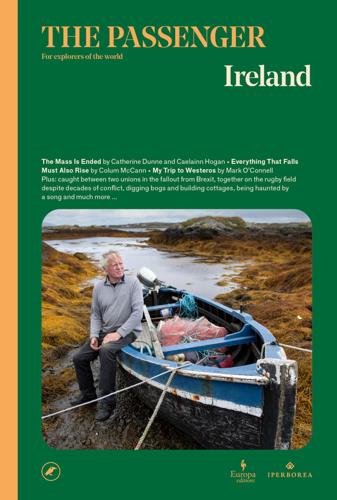
The Passenger
by
The Passenger
Published 27 Dec 2021
Over the complex and tedious reality of Britain’s relationship with the European Union, Brexit superimposed, among other things, a fantasy of tyranny and liberation, a return to a great national past of heroism and glory. And this imagined nation was threatening to radically affect the shape of my own. Fiction, at a number of points, was exerting an existential pressure on the structure of reality. A DOUBLE IRISH, PLEASE In 2003, after being wooed for a long time by the Irish government, Google opened its first European headquarters in Dublin’s Docklands, the former port area beside the River Liffey. Ireland offered a flexible, educated, English-speaking workforce – but above all a new flat-rate tax of 12.5 per cent on company profits.
…
Over the following years more technology firms set up not just in the area now known as Silicon Docks but also elsewhere in the country (Cork, in the south, is home to the European headquarters of twenty-four of the world’s twenty-five largest pharmaceutical firms), specialising in tax avoidance through complex movements of money through subsidiaries, such as the so-called ‘Double Irish’ arrangement made famous by Apple and later replaced by the ‘Single Malt’. At the cost of getting itself a bad reputation among its neighbours, Ireland’s economy and government finances derived huge benefits from the 12.5 per cent rate, with tax receipts ‘stolen’ from other countries and tens of thousands of new jobs created, to the extent that in the depths of the financial crisis the government refused to raise the tax rate as requested by the IMF, preferring to cut the minimum wage and social security instead.
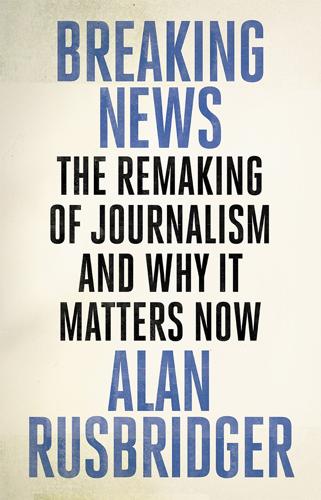
Breaking News: The Remaking of Journalism and Why It Matters Now
by
Alan Rusbridger
Published 14 Oct 2018
So, instead of tip-toeing away from the whole subject, we resolved to launch a major series looking at more than 20 prominent British companies whose aggressive tax arrangements looked questionable. We looked at, and tried to explain in simple terms, the so-called ‘double Luxembourg’, the ‘Irish branches’ and the ‘Dutch sandwich’. Seldom, if ever, had this world previously been exposed to such prolonged and extensive scrutiny. Newspapers are supposed to hold the powerful to account. But what if the powerful are not politicians – a relatively easy target – but advertisers? When newspapers had strong balance sheets that question should have been easy to answer.
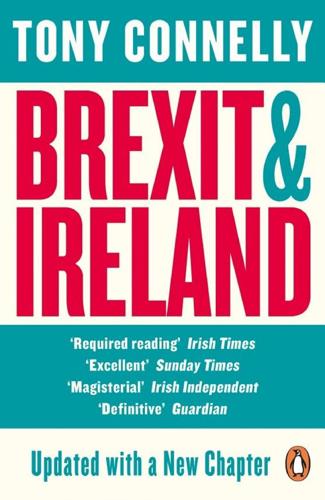
Brexit and Ireland: The Dangers, the Opportunities, and the Inside Story of the Irish Response
by
Tony Connelly
Published 4 Oct 2017
The New Zealand Grudge Match Any external observer of the recent economic history of Ireland could not have avoided a particular narrative: the economic boom had come about because Ireland was an open, flexible, skilled, low-tax, English-speaking economy right at the gates of the single market, prolific at securing hi-tech, highly skilled, world-beating multinationals. They had fuelled the boom, and the recovery. But the sector that would come to dominate the Brexit debate had nothing to do with Big Tech or Big Pharma or the Double Irish. That sector was food. The food produced in Ireland, whether animal or vegetable, by-product or finished product, will go to the very heart of how the nation will cope with, or recover from, Brexit. Food – whether living, free-range, slaughtered, processed, powdered, mass-produced into individually wrapped slices, converted into microwaveable dinners, scooped up from the sea, frozen and shipped to tables around the planet – will be at the centre of the worst problems Ireland faces when Britain formally leaves and works out its new relationship with the EU.
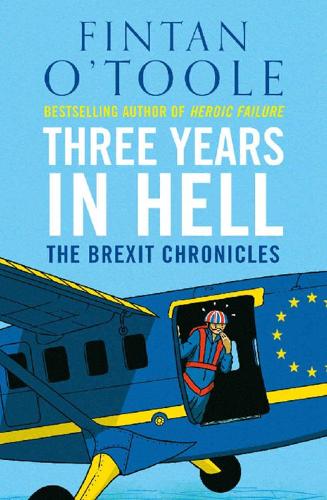
Three Years in Hell: The Brexit Chronicles
by
Fintan O'Toole
Published 5 Mar 2020
The great image of British authority this week was Theresa May travelling to Brussels on Monday essentially as a beggar, a supplicant desperately in need of the European declaration of ‘sufficient progress’ in the Brexit talks – and the bark of Arlene Foster peremptorily ordering the British prime minister to take back the promises she had made. Theresa May was experiencing the double Irish, capitulating first to the Irish government and then uncapitulating on the orders of a very different Irish force, the Democratic Unionist Party. And then, in the early hours of Friday morning, there was a further twist – both May and the DUP essentially signing up to what had been agreed on Monday.
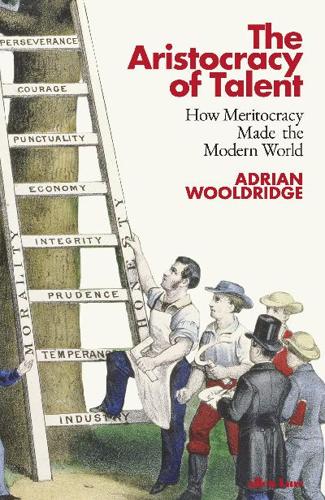
The Aristocracy of Talent: How Meritocracy Made the Modern World
by
Adrian Wooldridge
Published 2 Jun 2021
Not that long ago, only the most buccaneering companies made extensive use of tax havens. Now, leading companies such as Google do. Google achieved an effective tax rate of 2.4 per cent on its non-American profits in 2007–9 by routing profits to Bermuda, via Ireland and the Netherlands, an arrangement known as a double Irish. Thanks to the application of so much brainpower to tax minimization, about 30 per cent of all the world’s foreign direct investment now flows through tax loopholes.27 THE WIDENING DIVIDE What makes the marriage of merit and money particularly dangerous is that it’s taking place at a time when merit and democracy are getting divorced.
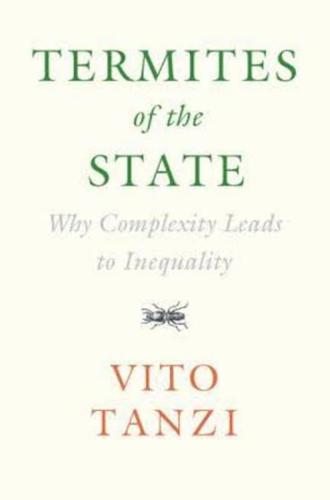
Termites of the State: Why Complexity Leads to Inequality
by
Vito Tanzi
Published 28 Dec 2017
Large enterprises, such as Apple and Starbucks, that have paid little taxes on enormous world profits have argued, with some justification, that they have been following existing laws and have not been evading taxes. The problem is the tax laws and not their behavior. Expressions such as “inversion,” “transfer prices,” “patent boxes,” “thin capitalization,” and “double Irish” have entered the lexicon of media reporting. They reflect tax avoidance strategies used by corporations. Similar examples could be provided from several areas of the financial market or from other sectors. Once again it must be remarked that those who benefit from these interpretations are not the average workers, and that these strategies end up affecting Gini coefficients and equity.